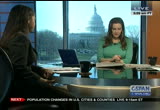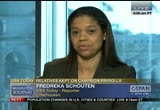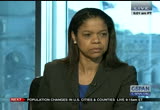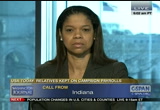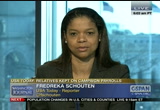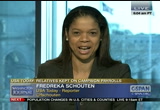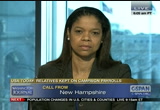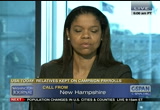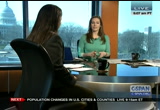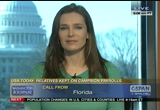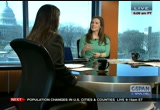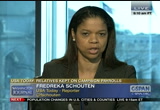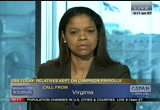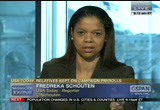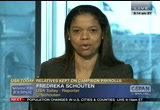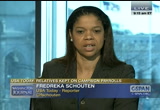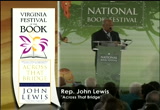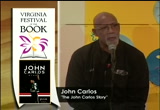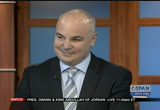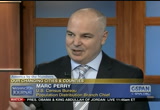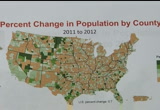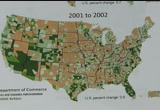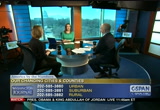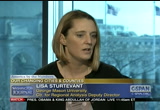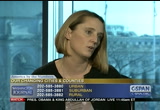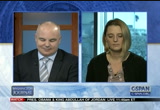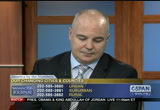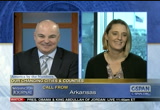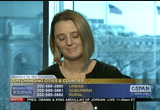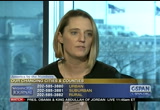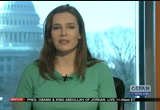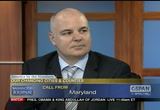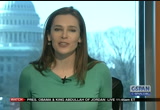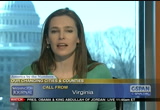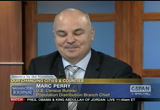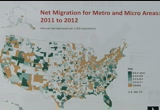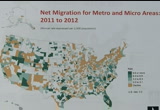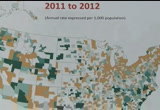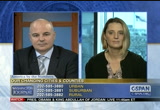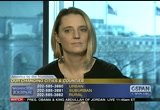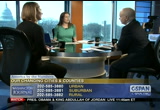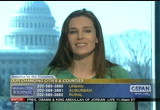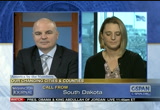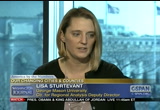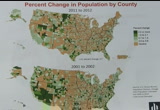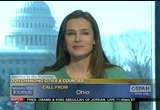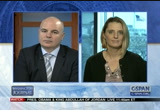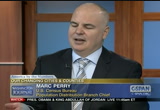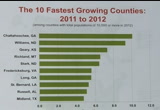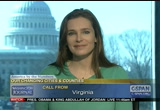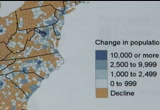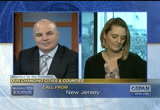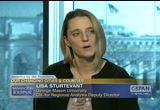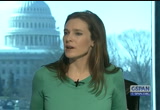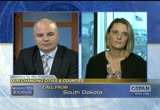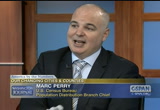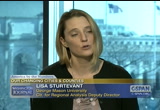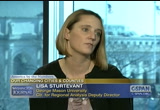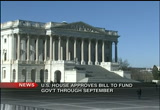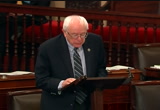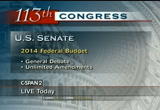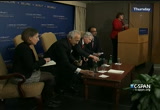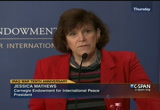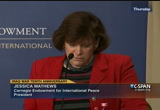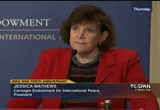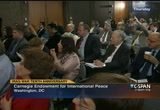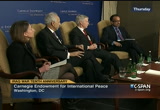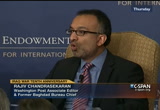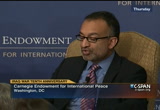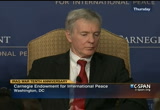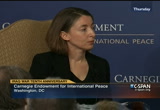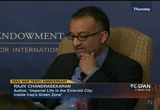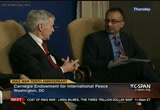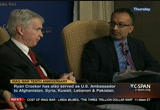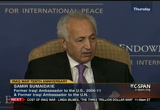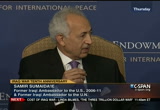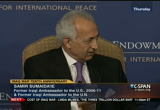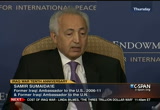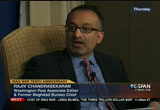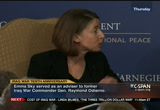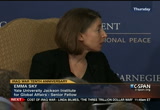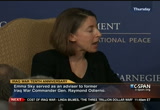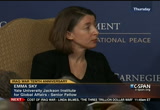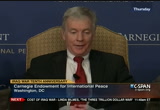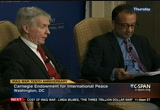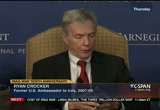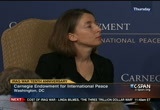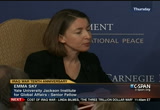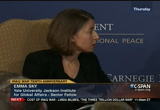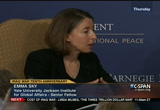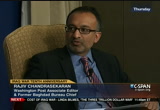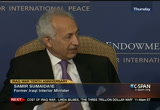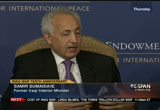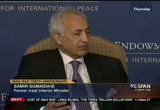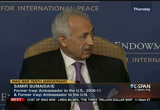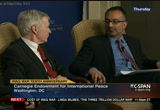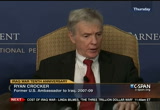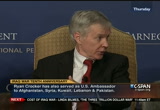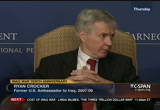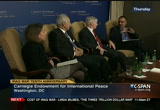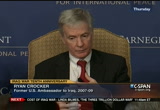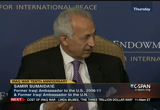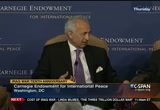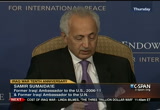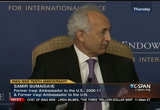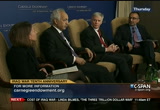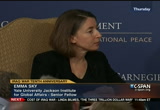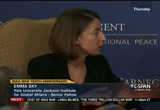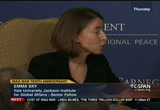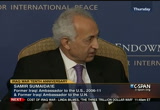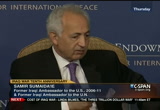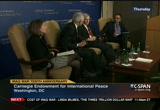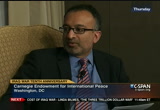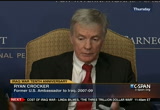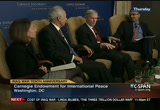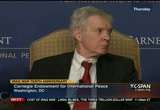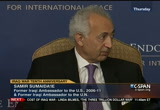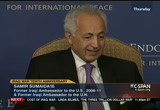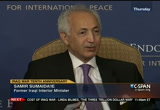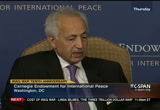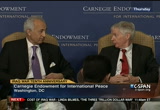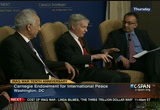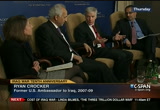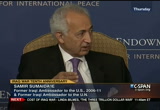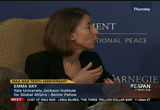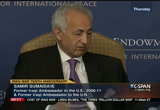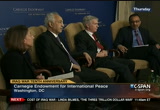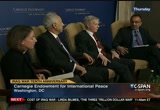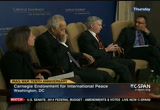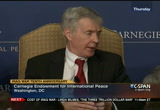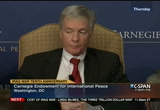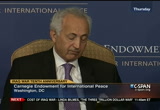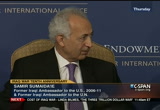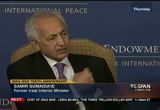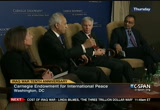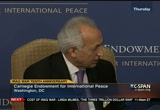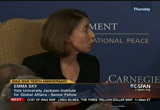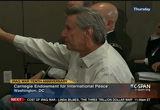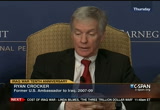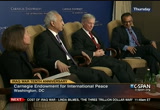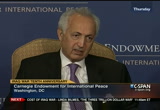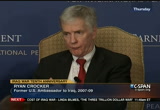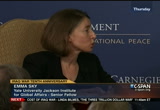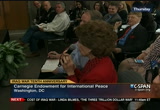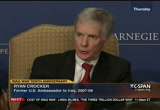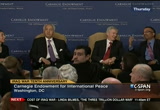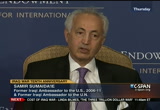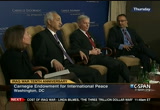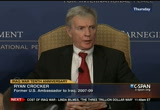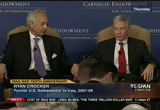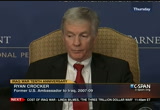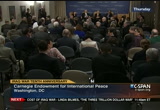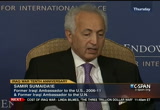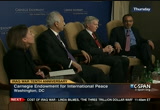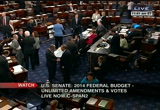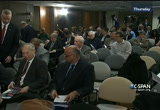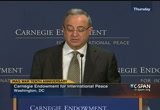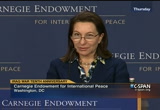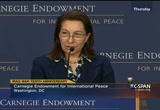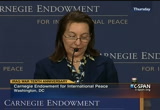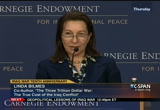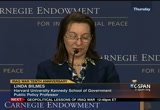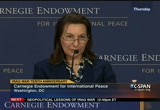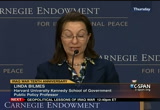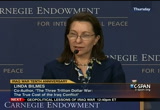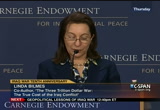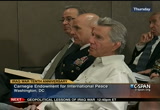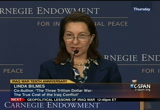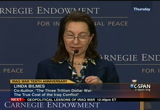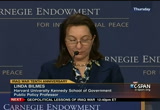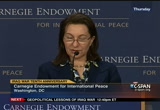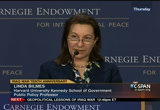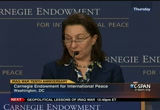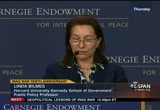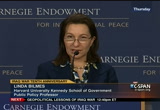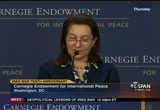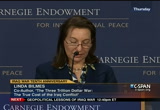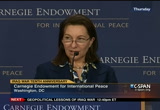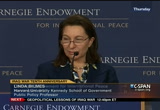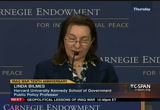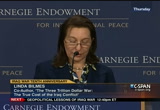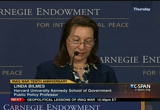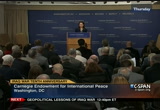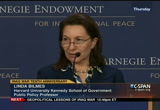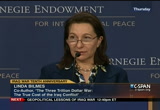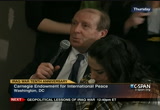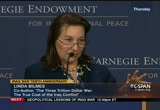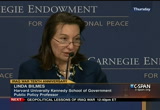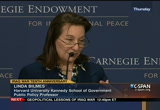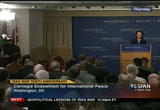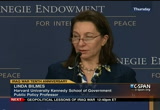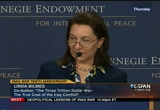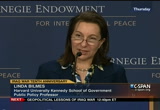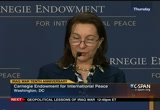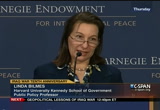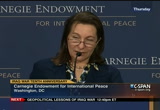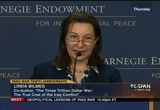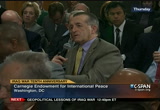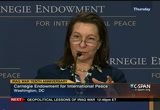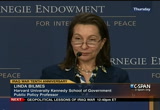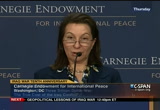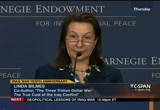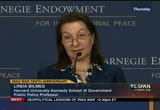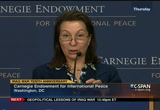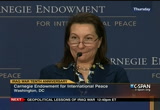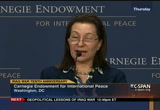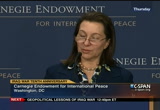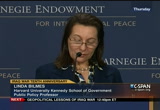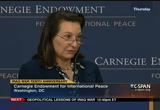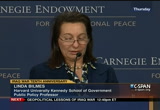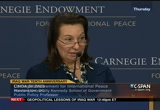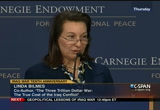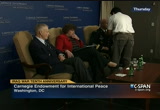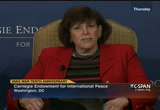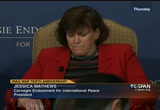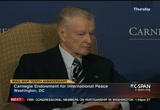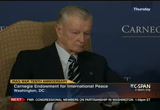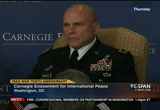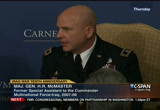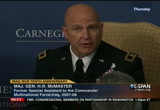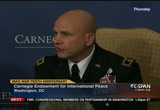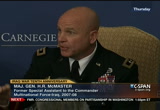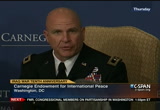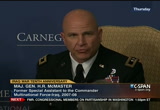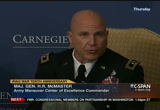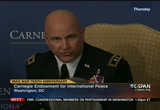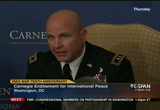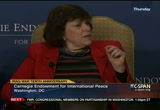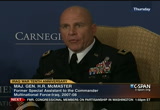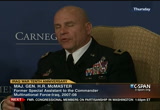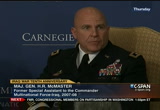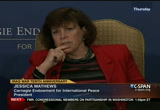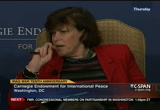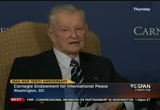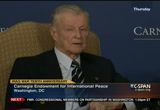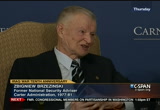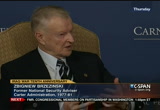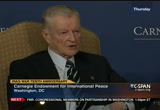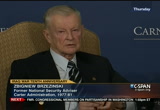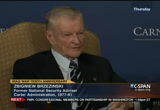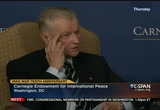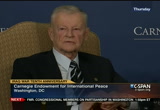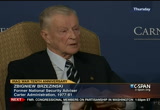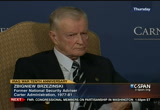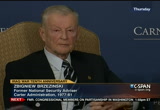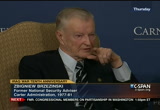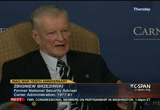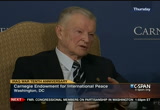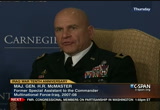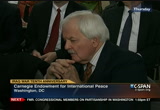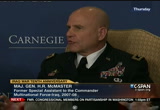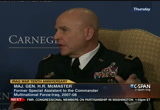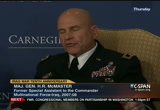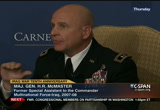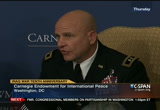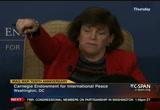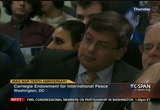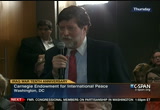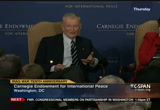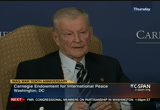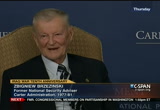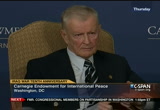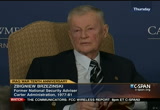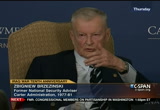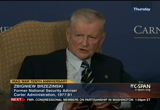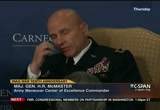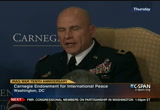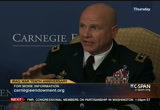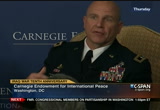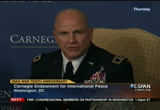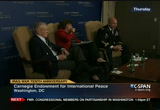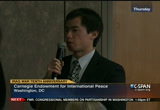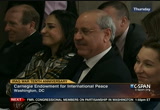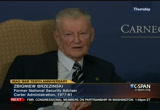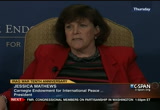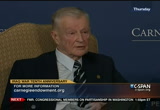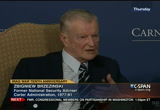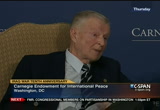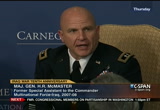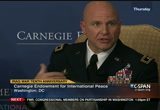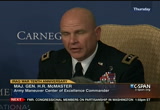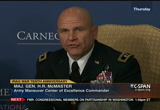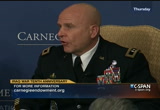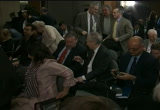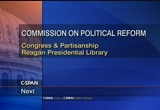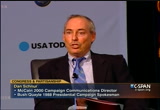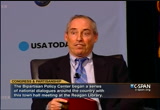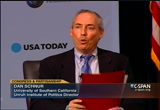tv Public Affairs CSPAN March 22, 2013 9:00am-2:00pm EDT
9:00 am
and you start off one of your stories by writing that anti-nepotism rules for head it -- prohibit putting members on the government payroll. little traction has gained despite high-profile controversies. as i mentioned earlier, a saide ago, jesse jackson kim my wife's company work for the campaign? opinion was that yes, she can, unless -- as long as certain things are met. we know jesse jackson pled guilty to misusing thousands of dollars in campaign funds for personal use. he clearly lost -- crossed the line. i think people are starting to
9:01 am
think, maybe we should once again revisit what is happening, where is the line was -- with personal use? a few years earlier, there was a lot of scrutiny when the california sensitive -- , his wife'sve company was getting a 50% commission for his campaign. .- 15% commission people got caught up in the larger investigation into the lobbying scandal. he was never formally charged with wrongdoing, but that was an episode where people said earning commissions, is that appropriate? ?ost: what was the end result guest: nothing has changed. it is still legal.
9:02 am
the whole compensation system is determined by the member of congress and his employees. or her employees, excuse me. host: independent color, indiana -- caller,. am calling in response to this nepotism. it is outrageous. campaign funds and use them for personal use, whether paying a family member or whatever, that is personal use and personal gain. at its worst.sm we have it locally. in every city, you will have one person retire from one entity of the government or stay and move right into another position. it is just crazy. when does it stop? there are people who are
9:03 am
very frustrated with the process. host: some have expressed their dismay at this practice. how much did you know about it before you started digging into it? is this talked about a lot? guest: i certainly knew about it. we had not seen anyone look at it in the 2012 election cycle. decided toe and i take a snapshot. it is something i have heard about. it has come up from time to time. in fact, it used to be back before they changed ethics rules about a decade ago in congress, there were relatives .n official payrolls so that has changed some. here are some other members of that "usa today"
9:04 am
9:05 am
veteran lawmakers. the idaho republican congressman who was elected in 2010 put his wife on the payroll. a few months after he got sworn in, may 2011, she earned about $41,000 over a two-year. -- timeframe. host: democrat line, welcome. john? manchester, new hampshire, independent line. caller: good morning, thank you for taking my call. , thank you foren reporting the facts. i believe almost every person is corruptible. if the media would report the facts, we, the people can make better decisions.
9:06 am
-- too many people in [indiscernible] that should be their mission. host: has the story influenced your vote? caller: no, not really. i am a small business owner. so many small businesses have their spouses or relatives there because they can be trusted. i forget who it was that hired both of their daughters because they were cpas or whatever. i would much rather have my niece hannah my money than a stranger. -- handle my money. i think if people had more -- they will be able to make informed decisions.
9:07 am
thank you for those thoughts. members of congress have said the same thing. guest: i trust my relatives, i want to have them do this work for me. i think you are right. our job is to write about it. this is why these records are public, and voters and readers can make up their mind about whether they agree or disagree. -- whatr caller qualifications did they have? guest: she handles the day-to- day response abilities, and the other is a cpa. what thementioned senator would like to see, but is there talk of having any movement forward on the house side, not just the senate? bill: i have not seen a introduced there yet.
9:08 am
i am watching it. some of thet out folks who were involved a few years ago to see what has happened and what will be happening. it is really tough to get any ethics or campaign finance changes through congress right now. there has been a big push over the course of the last couple of congresses having to do with the supreme court decision of citizens united, which opened up the door to a lot more money in campaign finance and elections. werenow, i think that is the major effort is at this point. i don't think that is going to be going anywhere either. host: florida, democratic caller, go ahead. .aller: good morning thanks for taking my call. [indiscernible]
9:09 am
start your sentence again. we did not catch what you said. the members of the family working for them during the campaign -- [indiscernible] the answer is yes. members of congress will tell you the campaign never ends. they are always fund raising and reporting to the federal election commission. the family members tend to work on the campaigns and work year- round on the campaigns. , i haveedreka schouten seen members have spouses in the office helping with clerical work. is that allowed? how careful do they have to be to keep things separate? guest: that is an interesting
9:10 am
question. a lot of spouses volunteer. some are paid because they are grandfathered in. they used to say this or relatives on the official payroll. but if you already had a relative who was working for you, they could continue to do so. so you do see some examples on the hill. while there was a long description in the rules that relatives can it work for you and it lists sisters, it did not list grandchildren. we had a case of maxine waters, who is the democrat from california, longtime chief of staff, her grandson. host: we're talking with , relativeshouten
9:11 am
kept on campaign payrolls. republican, you are up next. inler: i just wanted to say my opinion, i don't think that there ought to be a law banning relatives from working on campaigns. , soad is a business owner i worked for my dead for 10 years. i don't think there's a problem -- i work for my dad. we need to find more confidence in someone you already know. the issue here is the salary that these people are being paid. friends thatse helped work in campaigns. they are doing just as big a are making 30,000 dollars a year, $5,000 a year. when you hear a relative is making a lot over the course of
9:12 am
those years, that is over $60,000 a year. that is where the issue is. thatere is any regulation should be passed, it is regulating the salaries that they should be making. giving a fair salary to everybody and not just preference to relatives. interestingis an question. you are right. it affects morale. 32 members of congress dispensed more than $2 million in campaign funds to pay relative salaries during the last election cycle. louisville, kentucky, independent caller. caller: thank you for having me on. i am not a smart and politics as i should be, but it seems to mean this is a carryover from
9:13 am
where they a loud -- they allowed congressman to keep the money, finances they have earned. this is another way to keep best contribute to their families. also, how much money are they allowed to keep or spend during the campaign? it sounds like $1 million and benefits tokeep themselves. thank you very much. tost: they are not allowed personally benefit. they can't take campaign money and put in their pocket, put in the bank account. that will be against the law. there is a wide discretion. campaign accounts can live for after a member of congress has left. there are limits on how much they can raise from advantage of -- individual but they can amass millions and leave
9:14 am
congress, hold onto it to finance another run, give it to charities. i recently did a story about what former members of congress are doing with their money. they announced their resignation but they went on to buy a car or computers or stay in hotels or, you know, theribute to college and athletic program at their old college. there is a lot of leeway. one of the things that happens when former members of congress become lobbyists is that the campaign funds can be used to contribute to other members of congress. say a member of congress is planning a fundraising event, a former member of congress is now a lobbyist can write a check from that account to the current member of congress to attend the event. did, a recent story you
9:15 am
as fixed panel investigates ,epresented those ron andrews one a new jersey and one from alaska. guest: that highlights the fact that this use breaks the rules and breaks the law. we don't know what is happening in these cases. they are still investigating. it does not mean they have done anything wrong. it is case of andrews, alleged that he used campaign funds to take his wife and two daughters to a wedding in scotland. host: here is the story that .redreka schouten co-authored
9:16 am
you can find that on the website. guest: thanks for having me. host: coming up next, which parts of america are booming and which are losing residents? we will look at census reports and talk about what it means for your community. we will be right back. ♪ ♪ ♪ >> to believe in something that is so right, so dear, so necessary, you have to get in trouble. before we got in any trouble, we studied. we did not just wake up and say
9:17 am
we are going to sit in. we did not just dream one day that we're going to come to washington on a freedom ride or that we were going to march on washington, as we did in 1963, that we were going to walk -- march to montgomery as we did in 1950 five. we studied and prepared ourselves. >> they say black power intimidated people by using that phrase, black power. when they use that word that phrase, many people think black power meant destruction, blowing up the statue of liberty or ground zero, destroying america. it was not a thing about destroying america. it was about rebuilding america and having a new paradigm in terms of how we can be what each and every one of us did that pledge was going to elementary school and junior high school about the land of the free, the home of the brave. >> congressman john lewis and
9:18 am
john carlos discussed their experiences during the civil rights movement live saturday at 8 p.m. eastern, part of booktv this weekend on c-span 2. difference striking between what is happening today and 100 years ago is the columnist of the parade. 100 years ago, the parade was not a parade, so much as a riot. the police refuse to protect the marchers. as they progressed, the crowds got larger and larger. they were very unruly. they had been drinking. they started to throw things at the women. they shouted and told them to go home. not just that, streetcars continued to him see people into the packed crowd the crowd got larger and larger and more aggressive. the women could not go forward. the police were not involved. the secretary of defense called
9:19 am
out the calvary to push back the unruly crowd so that the women could continue their peaceful exercise of their first amendment rights. today, this is a wonderful peaceful assembly and as a liberation of how far have come in 100 years. >> this weekend, a look at the centennial celebration of the women's suffrage parade that took place on pittsylvania avenue in march, 1913 sunday at 7 p.m. eastern on c-span 3. >> "washington journal" continues. segment looks at the census numbers on publishing changes in america, what areas are thriving. our guests are marc perry from the u.s. census bureau. thank you for being here. also, to help us get perspective is lisa sturtevant from george mason university. thank you to you as well.
9:20 am
that thek at the map u.s. census has shared. how the population is changing in 2011 to 2012. we are seeing in green, areas that are on the rise. what are the takeaways from this? populationnew estimates, these are four counties and metro areas. host: counties and metro and micro? they are defined by the office of the and budget. they are built out of counties and the outer counties connect with intricate meeting. metro areas have a core of 50,000 or more. are very similar, just a big brother, little brother. host: what do we learn from this map? -2000 12.e top is 2011
9:21 am
we see different patterns going on in the country. this latest. arehis latest timeframe places we have not been talking about, places like small counties in western north dakota, eastern montana. these are very rural counties. the fastest- among growing in the country. this is is a departure from a couple of years ago. host: what are other growth rates in dark green? we do see growth in some of the traditional sunbelt areas like dallas and houston, austin, central florida is growing right -- quite rapidly right now. some counties in nevada as well, california. orange on you see this map. most counties lost population. are major areas that
9:22 am
have lost population's or once you want to point out? not much growth in the whole northeastern -- from new england across the great lake states to the eastern part of midwest. there is a lot of population decline and not much rapid growth. host: before we turn to lisa, give us a sense of how this compares to 10 years ago. we can see from last year what the growth looks like. guest: the country was growing faster than it is now. 10 years ago, we had more immigration. we had higher birth rates. the country was growing closer to one percent a year, now we are growing at .7%. we are down substantially from 10 years ago. you see that on this map. you see a lot more green than
9:23 am
you do now. most counties back then were growing. these were suburban counties, the out-of-town -- counties out of metro areas. they were rapidly growing through housing construction. they were on the outer edges, places like illinois on the outskirts of chicago, collin county texas, on the outskirts of dallas. their past few years, growth has slowed down quite a bit. host: if you would like to join the conversation, here are the numbers to call -- hear we would like to your perspective on what is happening in your community.
9:24 am
have you moved in the last couple of years, either for a job or family reasons? you can share your perspective with our guests hurried we are joined today by marc perry and lisa sturtevant. int do these maps tell you terms of the direction of the country? guest: i think the population of anre indicative emergence from the economic recession. i think about these maps when i .ook at the mobility rate residential mobility is these folks who move from one area to the next. 2012 the mobility rate picked up for the first time. it was driven from state to state migration. people are able to move for jobs. the population growth is very highly concentrated in the energy sector, that is,
9:25 am
counties and metro areas that have a strong energy sector, north dakota in a secular -- particular. host: what affects publishing growth? -- population growth? guest: employment. federal grants are driven by a formula that excludes population estimates. if you are and orange counties are losing -- population, that might be problematic because grants are tied to your population estimates. not that they don't trust the census, but their numbers are closely tied to funding. you talked about publishing growth and concentration. why is that significant? it is a two-part thing.
9:26 am
the country overall is growing slower than it was 10 years ago. the growth is more concentrated than it was. you have counties that are gaining and even fewer that are gaining a lot of people. half of the country's population last year to be accounted for the 46th largest gaining counties. populationcentrated growth, even more so than 10 years ago. it took about 63 counties to get to that 50% mark. host: beecher in greenville, kentucky. urban caller. good morning. theer: my question is for gentleman. toording to your data, these population numbers include people under the age of 18? guest: they do.
9:27 am
we start with the most recent census, the 2010 census. we update customers each year with information on births, deaths, domestic my big dutch migration, which is migration within the country, and inter- national migration. the national publishing growth has slowed in recent years, the u.s. population is up by 2.3 million. why is that significant? guest: the country is not growing as rapidly as it was a few years ago. go from annual growth from one percent 2.7%, that is a sizable decline from what it was. we see that play out in our county numbers because we have fewer counties that are growing. is maybe not surprising that we have had slower population growth. the decline has been due to the decline in immigration.
9:28 am
in a recession, the amount of regret coming to the country goes down. -- the amount of immigrants coming to the country goes down. rural caller. caller: i am about to take a job on monday in little rock, arkansas. the preparation has declined significantly. .- population has declined i cannot find employment in this area. my husband is not so happy because we have to live separately during the workweek week and see each other on the weekends. do you guys have any statistics that are impacted of working
9:29 am
one spouset may have living in one area and another taking a job in a different area? do you have any statistics on that? host: how are you splitting your households? it is going to be interesting to see how this works. a already have a home and mortgage in el dorado, arkansas. that we are not underwater here. our mortgage is going to be lower than the rent we are paying in little rock, not significantly, but i did get a pretty sizable raise that i will be able to afford the rent that
9:30 am
i will be paying. we will keep the mortgage down here. my husband may be joining me in little rock within the next 9-10 months anyway. we can combine our households together and see what happens. guest: her story is not atypical. she has a little better situation with the housing market situation. some have been underwater and unable to sell the house. a jobpouse gets somewhere else, there is tension. thee is a loosening in housing market. it is improving.
9:31 am
more are able to sell their house. host: she asked about whether numbers are capped. am not aware of that. manytory is implemented of americans. the story behind these numbers is one of people move to opportunities.d americans are dynamic much more so than most other countries in the world. opportunitiesthe are. what she is doing and her story is one that lays out across the country. host: lewis, maryland, urban line. i have noticed one trend in this area that because the older population is growing,
9:32 am
they have these large homes called mcmansions. they want to sell and move into assisted living. i am receiving invitations from assisted living organizations once a week to listen to their programs and move. the only thing that is propping up our suburban areas is the inability to sell these mansions. they are high maintenance. there are many senior citizens and baby boomers that will lead to move. if this gets solved, you will see a greater increase in the vacancies of the people for closing to get out of the houses. what do you think of the inability to sell larger homes and downsize? the housing market has been on the upswing in maryland and virginia and the district of
9:33 am
columbia. demand for smaller houses. houses that are closer in. there are a lot of homes in the suburbs that are not in demand. point, when they come on the market, there may be an oversupply of the bigger single- family homes. he is getting at a question that demographers ask --how are baby boomers going to behave in retirement? there are so many that their retirement preferences -- are they going to stay local? are they going to move to the sunbelt? it has national implications. alexandria,an line, virginia. caller: i am a former employee of the census bureau. i did computer operations in
9:34 am
southern kentucky in 1990. it was a great experience, unforgettable. i will take it to my grave. the census is one of the largest federal operations that is done by amateurs and almost always comes in on time and under budget. i live in fairfax county. the suburbant county in the dictionary, there is fairfax. the sensors is a fabulous operation. everyone that works on it should become ended. they are great americans, retired people, housewives, college kids. once in a while we need we need a pat on the back. tell us about why you live in a suburban area. the choices have led you to live in alexandria? am an engineer and
9:35 am
computer specialists. there is so much economic opportunity here. i am unusual. for the last nine years, i worked in iraq and afghanistan on computer projects. i am returning soon. i would like to be in afghanistan in 2014 when they turn off the lights. the quality of numbers depend on the diligent efforts of our fieldworkers. a pat on the back to everyone collecting the data that someone like me looks at and cysts through the numbers to get the meaning. we are glad to have people like you. host: one of the highlights of natural areas increased by 2.4 million, four of five metro areas grew.
9:36 am
what is significant about this? metro areas -- the country is a metropolitan. or than four out of five people live in a metro area. metropolitan people. we may not live inside the largest central cities but we -- that is where most americans live. dark green areas are the ones where people are moving to and the orange are ones where people are moving from. see areas across the country. this is not just a sunbelt phenomenon. places like florida are well represented. florida grows because of migration from other areas. we see that.
9:37 am
what have you learned from this map? there is concern about leaving the rural area. guest: there are two issues that are raised. , ithis economic recovery tends to happen first in urban areas. i do not think that we should jump to the conclusion that rural america is on the decline. there has been a longer-term trend of decline in rural areas. this is more emblematic that we are in the early stages of the recovery. there are different growth rates in the suburbs versus the city. in the washington area, we have had fast growth in the city, outer suburbs and slow growth in fairfax county. wisconsin, rural line. do you agree that a part
9:38 am
of this redistribution a population is a plan? if you are familiar with agenda 21 that has to do with the united nations and the .epartment of natural resources i live in the upper midwest, the border of wisconsin and upper michigan. i noticed on the map that the northeastern minnesota and northern wisconsin and upper michigan are depopulating. i have seen the color-coded maps put out by agenda 21 indicating that this is a red zone. red zones are to be depopulated to minimum. it is part of a plan. i would have to disagree. these patterns are
9:39 am
representative of the pattern of economic growth we have seen over the last several decades. >> the county that the county is -- caller is coming from -- that part of wisconsin has seen population growth. it has been a popular retirement destination for people from twin cities, milwaukee, and chicago. it is an interesting area in terms of being a very rural area that saw a lot of growth in the 1970's and 1980's. i live in new bedford. this area has always been hit the hardest out of the state. its population has declined because there is not any jobs here ever. ?an you give me any feedback when i was in college i was told that because the democrats do not put any money in the area
9:40 am
the republicans do not put money in the area because there is no use because it is a democratic area. why have you stayed in new bedford? how have you managed to stay? ander: i was going to leave my mother got sick. i left the area because i am in on.an potion -- eoepers my grandchildren out of this area. i do not see it growing. i have the best hopes. it has a lot to offer her. it does not have the right. they are doing studies of the money gets eaten up and there are no jobs once the studies are done. a shame because the area has a lot to offer and it is
9:41 am
declining because people are disgusted with the area. it has become a hydraulic area. there is not -- it has become a hydraulic area. there is no hope. guest: without knowing the structure of the new bedford economy, it is experiencing what a lot of people are experiencing. depending on the industries, you are a winner or loser depending on the structure of your economy. places that are strong in are growing.ces information sector, utilities. these are areas that have not been growing. host: talk about new england. aest: i grew up outside of town in massachusetts. it has similarities to new bedford.
9:42 am
.bout 100,000 people strong industrial heritage. it redefined and re-scope itself successfully over the last couple of decades. massachusetts recognizes that its older cities have these challenges. and i go home to visit, there have been efforts to revitalize the older cities. they have lots of charms. new bedford has a wonderful whaling history. has worked atry sincetizens -- census 1997. we are looking at population changes. our other guest is lisa sturtevant with guest: richey-- where mason university she is a p deputy analysis.
9:43 am
let's hear from bob, south dakota, rural. caller: i have some comments. [indiscernible] we should look at our urban areas. retracting and using that infrastructure that we have built and upgrading it. they have green belt and greenways and parkways you can walk down through in town. it preserves the rural atmosphere, which overhear people moved out into the country and take over farmland and you have the contact between the farming industry and some of the things in the world areas and how people perceive and
9:44 am
want to live in the rural area. some of the aspects of that are you revitalize that infrastructure in place. that is interesting. what we are seeing in many of our central cities is an urbanization, a return to a demand for living in the city driven by the growth of the gen ,'s moving into the workforce making choices about housing. they are coming to the district of columbia. the population was growing at 1000 per month. there was the idea that the desire for city living was on the rise. housing market has improved. our cultural identity with the suburbs and desire for suburban living is not evident.
9:45 am
host: you mentioned north dakota. learned about you that part of the country? guest: the situation in north dakota is interesting because on the surface, it goes against our recent trends in population growth. we were saying we were metropolitan. most of our growth has been on the south and west and suburban areas of large metro areas. these counties in north dakota have been growing rapidly in the last couple of years go against that in every dimension. they look different than what has been our fastest growing counties. is jobs and offer economic opportunities. but we see all the time is that people respond to economic opportunities. host: we are seeing a difference
9:46 am
between 2011 to 2012 and 2001 and 2002. are the short-term residents? are they saying temporarily? have they brought their families? have they bought homes? estimates are for permanent residence. understating are the transformation that has been going on. there are people that may be temporary employees and they will likely not be captured by these numbers. host: ohio, william. what is it like where you live? caller: it is country. i have a five acre tract. we are all jealous of you.
9:47 am
what trends do you see? caller: i am close to dayton, ohio. we have been hard with general motors -- we have been hit hard with general motors. . moved here in 1973 it is well depressed because all of the plants are being closed thegoing elsewhere because downturn in automobiles and the unions and that sort of thing. 1973 becausein they wanted to bust my kids 30 miles away. i was able to get land in the country. my closest number is probably [indiscernible]
9:48 am
i enjoy it out here. population presents challenges. population grows and a couple different ways. if you have more births than deaths, more people moved from elsewhere in the country, or through immigration. the situation in ohio with a couple of exceptions is it is not gaining on any of those fronts. you do not have to gain on all three. it has to be enough. ohio is a state with an older population. it is not gaining from having more earths than deaths. it has been a domestic outmigration state. it has not been and immigration gateway. when you compare it to other cities or states like illinois or florida or texas or california. host: what are the fastest growing counties in america? guest: what we are seeing on the
9:49 am
slide here -- chattahoochee county, georgia, which grew over 10% last year. tour.s. grew at a filed .7%. when you are growing at 10% per year, the population is doubling every seven years. that is rapid. these are among counties that had 10,000 or more people and 2012. there are counties in the decoders that grew faster but they are below that. guest: fredericksburg, virginia. caller: the patterns that we the energy and industry. we see that in midland, texas and richland, montana. several of the counties have grown because they have military
9:50 am
bases and there have been some faith groups and -- base growth . fort bend has grown and chattahoochee. places are losing population because they are losing jobs. toemployers are looking relocate, they will go where the population is. they are reinforcing cycles. that is what has happened in the midwest over the last couple decades. host: ashburn, virginia, suburban caller. caller: thank you for the census bureau that shares the information. it is important. i live in loudoun county, virginia. it has had tremendous growth.
9:51 am
i am wondering what the research has been. what does it show? is it because we are close to washington dc? guest: loudoun county encapsulates all of the great national trends. it is in our county of a large and fast-growing joe politan area. -- metropolitan area. it is the center of the high- tech industry. a lot through foreign-born migration, immigrants who have been moving to the washington region. loudounlocating in the area. .rom fairfax and to loudoun it has a young population. it is gaining from births over deaths. it is growing on all fronts. >> it has seen tremendous
9:52 am
growth over the last two decades. with the completion of the dulles metro rail through loudoun county -- host: lisa sturtevant from george mason university and marc perry with the u.s. census bureau where he is population distribution branch chief. newark, new jersey, cindy. caller: good morning. 2013. it has been five years since i last got through. [laughter] this is interesting. what popped into my head is something that i was saying the last five years ago when i called in. i am here in north new jersey
9:53 am
in the city has changed and itf population always seems that it is because of some political event that took place. i have love for everybody. the main thing is to have the need to stay folks and work where they live. it is difficult here. what i was mentioning five years ,go is the fact that public law -- urban.e.z.
9:54 am
enterprise zone. they need to do away with it. host: tell us about what they are. guest: she is talking about a larger issue. aside from the urban into size rize sozone, younterpi can attract young people. not as worried about public safety and more importantly about schools. when they get married and have children, the choice is dependent on the schools. cities are interested in maintaining parents -- attracting people and keeping
9:55 am
them in the city. schools are important. host: lisa sturtevant, dig into how immigration and migration affect the groupings around the country. andt: we look at emigration immigration. george t of it has domestic. we have been less like a to get people from overseas. due to the recession and policies. as the economy improves and legislation is approved, there may be a return of immigration. they are your typical immigrant gateways -- los angeles.
9:56 am
washington right now is a pretty established immigrant gateway. 20 years ago, it was an emerging gateway. charlotte, north carolina, salt ladke city, utah. our county is growing at this point. we have immigrants that have come from burma. they are a section of the country. they have coming to work at a turkey plant in our town. that has made our town grow and our county grow and the schools have worked hard to accommodate these children. we are having to have a lot of english as a second language instructors in the school's. increased the numbers of classrooms in elementary
9:57 am
school. -- sides. good size we were a community that was heavy on retirement. to visit from austin, texas and washington, surprised to see mostly older people on the streets. host: why were older people drawn to your community? did they live there all of their lives chose to stay? caller: mostly they chose to stay. some people come to retire, too. talk about what she is referring to. guest: her county and the trend of the meatpacking industry coming in and drawing in largely foreign-born workers from our is a typicalwhere
9:58 am
story. five years ago, if we are talking about rowing counties in the midwest, it would have been those count of counties. thatwas one of the stories came out of the 2000 census. places in nebraska and iowa and south dakota where overnight there were foreign-born amenities that popped up around ,. but theill a situation types of fast-growing counties, we are talking about oil. she isthe situation talking about, a lot of communities faces. when you have a a population with a greater share of and a smaller share of working age population, you have fewer numbers of people who are able to support the services
9:59 am
needed by the community. if this were a ceo shifts, there are less generate services -- there are less opportunities to generate services. host: how does a community change when emergence -- iimi grants come in? caller: it can be a shock. we had that in some of the outer serve to prevent communities whe there were rapid growth of the immigrant population. new idea ofng this what it meant to be a suburban community. it was a shift in the population from being 80% white to being 20% foreign-born. host: lisa sturtevant from george mason university. thanks for talking with us. marc perry with the u.s. census
10:00 am
bureau where he is the population distribution branch chief. thank oyou. it is all for "washington journal." we will be back tomorrow morning at 7:00 eastern. have a good day. [captions copyright nationalcable satellite corp. 2013] [captioning performed bynational captioning institute] ♪ >> a friday morning look at the u.s. capitol after the house of representatives adjourned for their two week recess, finishing work with funding federal spending at 2012 levels
10:01 am
and includes the $85 billion in across-the-board sequestration cuts and heads to president obama for his signature. the house also approved paul ryan's budget proposal which would cut 4.6 trillion dollars over 10 years, repeal the 2010 health care law and replace traditional medicare with a government subsidy to purchase health insurance. the house will return tuesday, april 9. we will have live coverage. meanwhile, a live look in the u.s. senate chamber. the senators will be speaking throughout the day.
10:02 am
50 hours of debate underway in the u.s. senate and you can follow that on c-span two. we expect a round of amendment votes this afternoon. among the amendments they have debated and voted on, the proposal by house republicans, the ryan budget, which failed in the senate as an amendment by a vote of 40-59, and they also passed narrowly an amendment the medicalveal device tax in the 2010 health care law. again, the debate is underway. we caught up with a capitol hill reporter for inside information on the budget proposals in the house and senate. among the amendments they have debated and .ost: let's talk about the cr guest: congress is saying at least for today we avoided a
10:03 am
showdown. the senate has passed it, the house passed it yesterday, and what it does is continue what we have seen from government funding. this is the era that we live in. rds that disagree on the way spending and taxes should go -- parties that disagree on the way spending and taxes should go. it keeps the sequester in place , although it does gives -- give .ome flexibility basically, it keeps in place what we thought we already had, which is a working government, sequester, and the ongoing pay freeze for federal workers. host: is the sequester here to i am starting to think that it has to be. twos harder to see how the sides reach an agreement when the democrats say let's replace
10:04 am
half of it with taxes and republicans do not want that. i do not think democrats want to give in. it is hard to see who will come from their position. >> we see the cr this week, and other boats on budget issues. tell us what the senate is grappling with. is a process we have not seen in a while, but this is where senators will offer to number of amendments their budget, and it is basically a democratic plan, calling for revenue to reduce the deficit, more stimulus and spending. we are in the funny process where we will wrap up 50 hours of debate and then start the unlimited amendment process.
10:05 am
any issue you have heard your callers call in and complain --ut, we might see today drone strikes against u.s. citizens, taxes, repealing healthcare -- they might all come up, but it is adding to a nonbinding budget resolution, so it is interesting and it might give people clues. host: a headline in your sayscation, "the hill," the senate is poised to pass a budget. guest: i think democrats will control the process and get it passed. .hey have a small window they can afford five democrats to not vote for it and still pass it, and in that case you would need vice president joe biden to break the time. -- the thai. .- tie
10:06 am
there is pent-up frustration on the republican side about no real budget debate over four years. once it is passed, a lot of people will feel better. democrats will say we passed a budget, republicans get to complain about the budget month but from there it is hard to see how the senate budget reconciles with the house budget. we are not aware that there will be an effort to bring them together and it is hard to imagine how they will marry them because they move in opposite directions. host: what happens after congress comes back from their break? what will you be watching for? guest: we will look for what is next in their agenda. they get to move to a regular schedule. a gunnate may take up bill. the house will be looking at more job-related programs.
10:07 am
we have been told the house will look at a bill to make it easier, making life easier for hourly employees if they get sick or have a emergency, to give themselves time to take time off from work and deal with those family issues. from there, a lot of the big stuff will go away and the next looming thing will be the debt ceiling. that is something we have not heard much about the last few weeks, but that is on the horizon. pete kasperowicz, thank you for talking with us. guest: sure, any kind. -- any time. >> expect a series of amendment votes. .ollow the senate on c-span two on c-span three, a group of middle east specialist will politics since
10:08 am
the fall of hosni mubarak. divided between the muslim brotherhood and the secular opposition parties. the event is hosted by the rand corporation at 10:30 a.m. eastern on c-span three. yesterday, former u.s. ambassador to iraq dissipated in a discussion about the current political situation in .raq and there is factions the discussion included the former iraqi ambassador to the u.s. and a former ambassador to the iraq ambassador. the 90 minute discussion was hosted here in washington.
10:09 am
>> ladies and gentlemen, good morning. i am jessica mathews. it is a pleasure to welcome you today to take stock 10 years after the launch of what turned out to be america's second- longest war. many of the direct outcomes and most of its indirect consequences are both at home and in the region still unfolding. one can certainly see the effects of the iraq war, for example, in our current agonized efforts in our decisions to decide what to do about syria, both in terms of public opinion and policy maker thinking. good journalism is the first draft of history. 10 years is certainly time enough to step back, reevaluate , and perhaps time for a good 30 draft. we cannot trace all of the
10:10 am
issues and impact of the war today. we will not do justice to a critical set of questions about how we got into the war. there is a good deal of revisionist history going on on that topic, which is critical for understanding what happened and why it happened, and essential to avoiding a repetition. we also will not try to treat in detail the impact of the war on the lives of individual iraqis. we are going to cover a lot of territory, and for us what seems to be the critical three sets of questions. we had one those, eye on the past, and one that is very firmly set on the future.
10:11 am
we are asking first, what is the state of iraq today? how far toward the original goal of a stable, functioning democracy has it come? what is the outlook for both for this country, the region, and neighbors? that will be the subject of the first panel. we will then look at the economic costs of the war. you might remember that president bush's economic adviser was fired for predicting that the war might $200$100 billion to billion. he was off by at least a factor of 10, at least, and we will hear from our second panel, maybe much more than that. ask,ly, we are going to from the u.s. point of view, what are the geopolitical,
10:12 am
military and strategic lessons in so far as we can see them from this near and far vantage point. what are the take homes from this conflict? a reallyssembled superb roster of experts to address these issues, beginning with this wonderful first panel. knows onuch each of us and conflict firsthand, looking around this room, there is a huge amount of wisdom here , but i know that all of us will go home a good deal wiser. thank you for joining us. i am really thrilled to turn over to the moderator of our first panel. everyone in this room and watching on television is probably familiar with his work.
10:13 am
10 years ago, he was covering the beginning of the war for kuwait city, and then in baghdad. he later wrote "imperial life in the emerald city" -- one of the best of many books about the war come and we are very lucky to have him. so, the microphone is yours. >> thank you, jessica, and thank you all for coming this morning to hear what i think will be a fantastic lineup of speakers all that. 10 years ago today, the lead story on the front page of "the washington post" appeared under my byline and begin "u.s. forces went into iraq after a rush, seeking territory, with only modest resistance. while the sweeping land invasion began under a hazy
10:14 am
second clone, a second point of cruise missiles destroyed several buildings in baghdad." two days ago, also in " washington post," -- "10 years country is neither the failed state that seems all but inevitable during the darkest days of the war, nor the model democracy americans set out to build. haunted by the ghost of its legal past, it is teetering between chaos and democracy, and threatens to pull it back into sustained bloodshed that citizens know so well." that is what we are here to 10 years after it began, what is correct today? on the precipice of dysfunction or isrtainty, civil war,
10:15 am
it twice to muddle through with competent security forces today prime minister who has established control? is that all of those things? it will not be rooted in the past. we will not relitigate prewar intelligence or dwell on the authority, as much as i enjoy the subject. we will not debate the surge and we will look at iraq today, and where it is headed. precious little of that, even though it is a far more relevant question for policymakers and the public today. with that, because you did not come here to hear me prattle on , let me introduce the panel and i will keep it brief because you know who they are and their contributions to stabilize iraq. to my immediate right, ambassador ryan crocker, who is now a fellow at yell institute.
10:16 am
he served as ambassador to 2011 and 2012 and his long career included posts as ambassador to, importantly for this discussion, iraq, as well as investor to pakistan, syria, kuwait and lebanon. two-august, 2003, he he served in baghdad. his long and distinguished career in the foreign service also included a tour in lebanon at the same time in the early 1980s at the same moment of the israeli invented it -- invasion. he is a recipient of the preferential medal of freedom, the highest award.
10:17 am
to the un inted 2004, and moved to washington to serve as ambassador. prior to his appointment to the united nations, he served as the minister of interior in baghdad. before that, he was a member of the governing council during the initial months of the occupation. he is currently working as a consultant and a writer. to the far right is, scott, also at the l jackson institute. she teaches courses on international politics for the middle east and the new iraq. she has worked at senior levels on behalf of the united states and united kingdom government in iraq, afghanistan and israel. she was the government's director in kirk look. she is best known as serving as a political advisor to the
10:18 am
commander of u.s. forces in iraq. instead of asking our established analysts to deliver long opening statements, i have asked all of them to tackle three broad questions at the outset before we launch into what i hope can be a robust discussion. the questions will talk about domestic politics, the role in the region, and the relationship with the united states. let's start with domestic politics. it appears your rent is a tinderbox. -- iraq is a tinderbox. fundamental disputes have not been resolved. it seems the government is crumbling. the prime minister will not come to baghdad because he fears he will be arrested. there has also been boycotts of the capital there is also been
10:19 am
announced intentions to boycott the government in recent days. i would like to begin with top- level assessments of the domestic situation. is the primeocker, minister taking a page from saddam hussein playbook? >> it is a great question, and i thought you had a great quotation from the article two days ago. iraq is haunted by its past. maliki is haunted by his past, recent and not so recent, in my view. he came out of a clandestine movement that was severely persecuted under the saddam years. that conditions his behavior. it is said in iraq by the prime minister that only two men successfully governed iraq.
10:20 am
i do not think maliki is trying to be the next saddam hussein. the politics and conditions in iraq will not permit it. he is afraid he may be the next kassam who overthrew the monarchy in 1958 and who was a pretty able political figure. he was making deals, breaking deals, bestowing a favor, withdrawing favor, but eventually it got away from him. to read maliki correctly, the best perspective is someone who is playing defense, who is trying to stay in power, who was trying not to go the same way as kassam.
10:21 am
>> thank you. ambassador, let's talk about sunni politics. there have been large demonstrations. what are the chances that the current state of sunni frustration, anger, sense of disenfranchisement will spill into something more violent and destabilizing? >> it is already spilling out into violence and we hear every few days of explosions, acts of terrorism. they're not totally disconnected from the general dissatisfaction of the population, and there is a great deal of dissatisfaction amongst the iraqis about but i want to elaborate on that.
10:22 am
get back to the mindset of the government. i agree totally with ambassador crocker's assessment of the way maliki thinks, but i would like to add to it that iraq is a state -- whoever controls the resources controls the system of patronage that builds the power structure. in a state like the united states, the population pays taxes and the government is accountable and that system is not there in iraq. whoever oversees oil seizes power. that is a major factor in conditioning the mentality of the group that rules. they put their hand on that and
10:23 am
they will not let that go. coming back to the sunnis, i remember growing up in a country where the sectarian divisions were not really relevant. we did not who was sunni or shia. a sectarian policies of saddam's regime and the oppression he imposed on the shia, this sense of being persecuted was strong amongst the snia. the opportunity came, there was a segment, the islamists, who were thinking now, we have got it, we will never let it go. it will be a shia government.
10:24 am
that put the sunnis a difficult position, and in the early days they brokered the political process. that did not work. they then joined in it. that is not working. now they are caught in a difficult position. they do not want to go to the extreme where al qaeda is because they get themselves where victims of al qaeda. at the same time, they are being marginalized and being treated as second-class citizens. it is very difficult. i must say that their general dissatisfaction is a much s is part of a much wider dissatisfaction. they will feel that there are no services, no security, no progress, no jobs. where on earth are we going? the country seems to be in this situation where it is not moving at all. >> fantastic. much to delve into, and the circle back particularly on the
10:26 am
[indiscernible][indiscernible] [no audio] tell us about the state of kurdish-era politics at the moment, all these concerns that moves by the kurds enter in selling their oil from the north and or i should use that word carefully there, oil, oil extracted in the northern parts of the country and their efforts to sell that further stoking tensions with the central government. help us understand as well as obviously key unresolved land rights issues of in the north, help us understand where things stand today. >> at one level kurdistan is the success story of iraq. there is much more employment. people feel happy and they feel is in better than they have had in the past. at one level this is the kurds' moment. the nation's between kurds and baghdad have never been so poor. there is an absence of trust among the elites in iraq. this boils down at the moment to personal disputes between the president and maliki. kurdish leaders fear that maliki is becoming an autocrat. their sense of history, they are affected by it in the same way that maliki is affected by it create the kurdish sense of history always make them fear the central government, and they see the tanks, the f-16's could be used against them, so there is a huge distrust. before it was president talabani who served as the mediator between the president and maliki.
10:27 am
and now there is nobody who was brokering that this agreement. there really are substantial issues to be dealt with. the issue of land was supposed to be resolved after the constitution. it has not been resolved. in those disputed areas, if they become part of kurdistan, all this that should have been put in place have not been put in place, whether a sense of referendum, none of that has happened. the kurds are frustrated in thinking that is never going to happen. you also mentioned the oil issues, and the kurds have been exporting their oil, as you call
10:28 am
it, three trucks to turkey, three trucks to iran, and there is talk now about a direct pipeline between turkey and kurdistan. they have been giving out will contracts to international companies, and some of those oil contracts have been for building a in disputed territories. the central government is a great concern because they fear that if the kurds can have a --rect pipeline with jerkily, , rkey that will lead to the breaking off of iraq. we sell in the months last year and the year before the movements of iraqi security forces facing off against each other in the disputed territories. when u.s. military was there, it
10:29 am
served as a mediator between the different forces. now there is no mediator and there is concern that it only takes one shot to get the spiral of action. recently, the budget was pushed through parliament without the agreement of the kurds and with many of the iraqi members boycotting it. but that is what has led to the kurdish boycotts of government because they fear that maliki does not want to share power, they now fear they are not equal partners in iraq. we're back at the beginning in 2003 and 2004, where we heard kurdish leaders say now for the first time i feel iraqi. more and more the kurds are becoming autonomous, they are seeking economic independence from baghdad, so they are drifting further and further apart. >> so much there. we could spend the next hour just following up on this stuff. i promise we will get back to all of it. i want to talk about iraq in the region and iraq and united
10:30 am
states and we will circle back. it obviously it's to much concern about the relationship that has been forged over the past several years between baghdad and tehran. ambassador crocker, give us your sense of the true nature of the air around iraq and iran today. >> if i could give you an accurate assessment of the true nature of the relationship between iran and iraq today, it would be elevated to a celestial status. which may happen, but it will not happen this morning. [laughter] it is a highly complex relationship. there can be no question that following the withdrawal of all u.s. troops in 2011 and to speak
10:31 am
frankly i think a waning of u.s. engagement at other levels, it has shifted a balance showed that -- so that iranian influence in iraq is greater than ours is less strict there's no question about that. at the same time, i do not buy into the tendency in the west and in the united states that iran calls the shots and gives the orders because it is, one, a shia government in tehran, dealing with another shia government in iraq. i think that differences that we often lose sight of between arab and persian, the, again, history, history, history, the
10:32 am
bloody history between iraq and iran, the brutal war of 1980's, which we tend to have forgotten, but no iraqi or iranian ever well, remains fresh in the memories of the questions. iraq is, whether sunni or shia, is profoundly an arab state and for many years was the vanguard of arab nationalism. i think we are going through an interval here wear because people lack a regional or international balance, iran has a disproportionate influence in iraq, but i think the farther they press that influence, as i
10:33 am
saw during my time there, the more iraqis tend to push back and resent it. so, i would seek probably a prolonged period where this will play out. iranian overreach is going to produce an iraqi backlash. they will have influence. they will not have control. >> let's talk about syria. there is a tendency here in washington to view maliki's acquiescence to iranian overflights because of pressure. but maliki has his own reasons for wanting to have assad in power. is it the kinship between shia
10:34 am
and alouites, is it a concern that if his government is toppled it puts pressure on sectarian tensions within iraq? help us understand why the maliki government is taking the position it is, regarding the conflict in syria. >> you look for simple explanations. many international jihadis entered iraq and committed acts. whether they facilitated or not, they did not stop it. in 2009 after a particular set of horrific bombings, maliki wanted to take them to a criminal court.
10:35 am
it looks like saddam's regime, when people see an uprising in syria, it looks like iraq in 1990, 1991. how did this come about? it is simplistic to say that -- more the issue is maliki and shia is they must see the threat facing them in the same way that iran sees the threat, and by the threats, i mean this fear of the sunni regime's getting together, coming together to overthrow the shia regime of assad and then overthrowing the shia regime in baghdad. it is this fear of the alternative. it is fear is assad is on the turn, that people will come to power of the most salafi branch
10:36 am
of the opposition, and that is propagated through the media, in dialogue between people. but the relationship between the syria and iraq is very complex because of the different communities inside of iraq have differing relations with syria. yesterday when robert ford went testify, he testified about how the iraqi government was not preventing weapons from iran reaching syria. he also described how shia extremists were inside syria fighting on behalf of the regime, and there are also plenty of sunnis fighting in syria from iraq, and going back and forth, and also kurds inside syria see an opportunity, and there is fear that if assad goes, kurds will become more empowered, and how will that
10:37 am
affect kurds inside iraq. they are all interconnected. >> in looking at the interconnections, let's branched out a little more and look at iraq more broadly in the arab world. ambassador, we are more than a year on from the start of the arabs spring. iraq has a large border with iran, but also the border is jordan, saudi arabia, kuwait is a player. help us understand how the maliki government sees its relationship with the broader arab world at the moment and how its neighbors, beyond iran and
10:38 am
syria, which we have talked about, view iraq today. >> back in 2003, in the days of the governing council, the first senior delegation received from outside iraq was not from an arab country, it was from iraq. there was a kind of denial amongst the arabs that what the americans did did actually take place. in some quarters in the gulf region, there is a kind of phobia up here, and that played into the situation, particularly exasperated by the facts that
10:39 am
shia as political parties themselves looked at this as an opportunity to seize power in iraq, as shia, not iraqi. there is fear on both sides feeding on each other. the iranians proved to be very adept, and they moves swiftly. they utilized their investment in shia islamists who were nurtured in iran during the saddam period and built close relations with the leaders of the islamic republic. and they never looked back from there. now, coming back to the arabs, the more they see of this, the more estranged they become from the new iraq.
10:40 am
iraq has traditionally been, as you said, ambassador, an arab country in its identity, as it looks at itself, but a country with a proud arab history. there is another layer now, a layer of sectarianism, which has been struggling with a layer of nationalism. there is one symptom, but at the political level, at the leaders of the islamic parties, there is a different kind of -- and therefore, as we progress from 2003 into the turbulent years of 2006, 2007, the arab press the other arab countries started to point out chaos, failure, all because of the iranians, and the
10:41 am
american mismanagement, and we never seemed -- and it was very hard to get iraq back into its arab niche. we got iraq back into the arab league, but it remains a work in progress. it is never really integrated back. that is where things stand. there is a recognition that iraq should be part of the arab fold, but there is any hesitation between that sense and the sense that iraq is close to iran at the moment and that iranian influence is very apparent at the macro and micro levels.
10:42 am
>> fantastic. so much to bore into. would like to talk about the state of the u.s.-iraq relations, and we will tell in the conversation on all this stuff. it has been 15 months since our last combat forces drove out of the country. there is a large diplomatic presence there. we still have some military personnel doing some arms sales and training their and our intelligence community as individuals on the ground. help us understand from your perspective iraq-u.s. relations today, and i would like to start out, if you might offer some thoughts, if the sofa process turned out differently, if we had 10,000 u.s. troops in the country today, would things be appreciably different? would iraq's relations with iran
10:43 am
be different? would they be dealing with syria differently? if we had a military presence on the ground today in the thousands, would that give us any meaningful leverage in the politics of the country? >> i would defer to the ambassador for an iraqi perspective, but it seems to me that had those security negotiations succeeded and that we had a presence along those numbers, that is not enough to make a military difference, nor should it be. it would be a powerful signal in iraq to iran and in the region that the united states was engaged, involved, interested, and effective, and i think it would have reshaped calculations
10:44 am
in capitals, starting with baghdad, and tehran, and right around the region. again, the military as it were, as a political presence, as a signal of u.s. engagement and involvement. during my time in iraq, in addition to the first security agreement, we had a long term should that was intended to send that very simple. it was predicated on the assumption, which i think at the time both governments in the united states and in iraq, shared, that there would be a successor security agreement. the intent on the sides was a signal for the first time since the 1958 revolution that
10:45 am
overthrew the monarchy that iraq was going to be a strategic partner of the u.s. in particular and of the world in general. that agreement still exists, still in force, but i think the full withdrawal of u.s. military, except for the small contingent left for training and equipping, reduced our leverage. i would say one other thing. you can still have substantial leverage in international politics without military forces. i am not sure that we have taken full advantage of those opportunities, and i hope very much as we enter a second obama administration that the administration is going to have a greater and deeper focus on
10:46 am
the importance of iraq and engage iraq more fully, more frequently, and at higher levels, because we have seen what happens when the relationship deteriorates, as it did after 1958, and particularly under saddam. with our military leverage gone, we need to take advantage of the agreement to increase our political leverage, not to make iraq do things, but to demonstrate to iraq that it has a partner, it has an ally, it has options other than looking to iran for all the reasons that emma sky just laid out. >> as you know, there is a limited bandwidth in washington in dealing with these issues, and part of the tragedy of afghanistan, was that we turned so much of our attention to
10:47 am
iraq, and with the administration's focus in afghanistan, as well as a broader set of issues, it has come at a cost in dealing with iraq? >> as has been said in the past, we are a great power and we can do more than one thing at one time. there might be a bandwidth issue, but that is an intention issue rather than capacity. we are talking about simply taking a rack seriously as our agreement says it should be of the levelving of senior diplomatic engagement that sends the signal in baghdad and the region and i hope we will see that because it has
10:48 am
been absent. ambassador, how do iraqis view the relations with the united states? >> if you ask any individual iraqi, you might get two different answers, so if you ask many, you can imagine the spectrum. iraqis are conflicted about their attitude for the united states. from the beginning, some saw the intervention as a threat, and others salvation. those that saw it as a salvation later found they were disappointed in that respect. in theere shifts perceptions of individual attitudes. amongk broadly, especially the enlightened population, everybody is glad
10:49 am
and rightful that saddam and theyas removed were able to speak their minds. forof these were huge gains direct, but they were quickly smothered -- four direct, that they were quickly smothered by lots of problems that came in the wake of this emancipation. at the government level, we went through the negotiations and the agreements, the strategic framework agreement, which is still in place, but it would not be wrong to say that the iraqi government at the moment does not see the american presence or influence is in
10:50 am
trouble -- internal part of its political calculation. it was a few years ago, when political decisions were taken. they always factored in what the americans thought. you probably remember when you were ambassador in baghdad, but i do not think that is the situation now. i would venture to say there is for what the iranian regime thinks about political decisions in iraq, whether it is forming a cabinet, or any other major political decision. but that does not mean americans have lost all influence.
10:51 am
. they have significant amounts of soft power. they are using it in support of civil society. i think in supporting the segment of population who are secular in their outlook, who believe that the separation of religion from the state is the salvation of the country, that is the natural ally of the united states, not the islamic side. i think there should be more support for the politics of secularism in iraq. it would not be wrong. in fact, i would say and be necessary and highly desirable for the americans to support their natural allies, which i
10:52 am
happen to believe represent the future of iraq and i myself am part of, at a personal level. so, there is this conflict, and this conflict is not resolved on the boards. the outcome of this will depend on how much the united states is willing to put into the right factors to get iraq moving in the right direction. if they fail, it will be very unfortunate, but the people who will pay the price will be the people of iraq and american interests in the region. >> very quickly, the european perspective on the u.s.-iraq relationship, emma. >> i think many people looking
10:53 am
at that relationship feel that the u.s. wants to forget about iraq, start looking at it through the rearview mirror, look beyond. and people find that quite difficult to understand, after all that investment. huge investments in blood and treasure over the years. when you look at the time of the surge, the u.s. reputation was way high and the iranian influence way low, and now the balance has completely changed. people think the u.s. has much more influence and is not wielding the influence it could have. people ask, why does the u.s. not do more to contain some of maliki's worst instincts? why do they not do a better job balancing the different communities within iraq? and you can ask a follow-up question. >> how should the united states be doing that, and then i would love to hear from the others.
10:54 am
how do you all believe the united states should be read calibrating its relationship -- re-calibrating its relationship, and to build on the point, if the natural allies of the united states are those that believe in more secular government, how do you do so in yje zero sum nature of iraqi politics without further worsening relationship with maliki? >> i think people believe the debt on maliki in 2010. rather than -- bet on maliki in 2010. rather than investments, it was seen as maliki is the guy.
10:55 am
but the long term interest is for iraq to be more democratic. it is never going to be a liberal democracy in the west style. but as the ambassador said, it is a strategic framework agreement which provides the framework to do that, to invest in institutions, to build a better relations with iraq's people. there is also the huge influence that the u.s. exerts with neighboring countries. baghdad needs the u.s. to use that influence to help iraq, to help baghdad, to help malick he himself have better relationships. and of course, there are the arms sales. will the u.s. continue to just sell arms, sell arms with no
10:56 am
conditions placed on it? if those arms are used to oppress mr. maliki's domestic rivals? >> how else should the u.s. recalibrate that relationship? >> well, i think it is possible to have a two-pronged relationship, even with the government. we will support you, but we will not support aggressive action. we will support you, but we will not accept human rights violations. we will support the political process and the political system as long as it actively serves the principles on which it was built. now let me make a very important
10:57 am
point of this juncture. at the beginning, when we were writing the traditional -- transitional administrative law and later on when the constitution was negotiated, there was an assumption that the players were going to abide by the rules. this assumption was wrong. some had no intention of abiding. they went along, but as soon as they got into power, they started flouting the rules, blatantly. i mean, explicitly, it is stated in the constitution of certain institutions which are independent, like the central bank. the law made clear that it was independent of the government.
10:58 am
media, i was the head of the media committee, and we tried to structure a media commission that was intended to be independent. all of these have been reined in under the auspices and the control of the prime minister have done it on the basis of, well, these all have some executive functions and therefore they should be part of it. they are abusing the semantic definition. that really means a kind of hijacking of the power of all these institutions, which are the guardians of the democratic system. once these have gone, what do we have for this democracy?
10:59 am
the americans should make it clear where they stand on these issues. the general perception in iraq is that, well, maliki is in power because both the iranians and the americans want him to be there. that should be dispelled. it should be clear that the americans are committed to the political system in iraq, not one individual, not one government. governments come and go, but they must be built on a foundation in order to be sustainable, in order to create the stability and therefore the prosperity that will flow out of iraq. >> what is the clearest way to do that?
11:00 am
i mean, we talked a little bit about tariffs. is it time to reevaluate arms sales at this point? >> i think it is time to engage in a serious, sustained and high-level manner. and through that engagement, exert greater influence, frankly, with all the parties. i think they could all use it. and to use as your structure for that the framework agreement, because it is about institutions, their strengthening and their endurance, as well as it is about cooperation in a variety of fields that are of benefit to iraq as well as the united states. we have a very able ambassador in baghdad right now, but the nature of the relationship, the recollection of the iraqis over how it used to be, with routine high-level engagement, i think suggests strongly that to get at just the point that have been raised, we have got to of our
11:01 am
game here. -- up our game here. i like to see the secretary of he did not visit. i love for the secretary of defense to visit iraq. visit countries and it would get everybody thesing. i like to see chairman of the joint chiefs of and these kinds of visits provide a framework to their and arms like balances sales and conditions and some useful words of advice to those in the opposition because i
11:02 am
11:03 am
would that be a positive development, in any of your views, or a prescription for even more trouble ahead? that?n't you tackle >> muqtada al-sadr has been a rather unpredictable player on the iraqi stage. he came in on a wave of love admiration because his father was murdered by saddam hussein. as father was a singer, writer and a clergyman, a remarkable person viewed with great respect. but there were those who
11:04 am
venerated him. and this was his son. so, he was swept into this position of power, for which he had no qualifications whatsoever. therefore, he was a candidate for manipulation by people who had much more experience, including our iranian neighbors. so, his recent actions -- although i think his instincts were, as you pointed out, much more nationalist, iraqi, helping the board, but his olitical -- helpin the poor, but his political motivations were all over the map. what he will do the next day, the next month, if you ask them, i think he will get -- again, and answered today and a different answer tomorrow.
11:05 am
it is difficult for me to sit here and say how he is going to act, but he is a factor and he will continue to be a factor. the next elections next year are going to show, hopefully, the more mature response from the electorate. having said that, i quickly add the qualification of this will be, again, colored and tempered by the fears of being whipped up right now. you know, among the islamist is a weapon they use, the sunnis are coming to get you. and that is now amplified by the sunnis arabs are coming to get you. the conflict in syria -- that
11:06 am
makes the fear even more potent. the best things that the sunni arabs in iraq should do is try to alleviate this year. -- this fear. --t of the wider element is aware of the danger of this fear, of government out of control. coming back to muqtada, the next elections, if they are not totally colored by a fervor, might produce a more mature out, and provide a new crop of younger leaders who have been less contaminated by
11:07 am
the events of recent years. there is a ray of hope there. >> if i could just add to that, i agree entirely with the ambassador's assessment of muqtada al-sadr. he himself does not know what he is doing the day after tomorrow. sadly, assassination can be very effective and the assassination of his father and two brothers -- sons has had a lasting effect on iraqi politics, as has another assassination. 2003.as in in the sadr family, that once stood not only for a form of shia some but
11:08 am
ism, but for shia- iraqi and arab nationalism, we are now down to be shallow end of the sadr gene pool. [laughter] there was a period in 2008 when he hope was, which you articulated, that dsadr, to -- that sadr would make that out reach over the sectarian divide to the sunnis. it never really happened, to the immense relief of the kurds, and therein lies the complexity of all of this. you can manage to make perhaps two out of three reasonably content, that getting three out of three has deluded us and the
11:09 am
nd the eluded us a iraqis for the last decade, and iraq for the last century. come back to with respect to the u.s. not only do i believe we need to be more effectively and decisively engaged with iraq, i believe we need to be more effectively and decisively engaged with the region on behalf of iraq. i made the rounds as ambassador. i made what i thought was a pretty persuasive talking point that if you are concerned about iranian influence in iraq, why don't you reopen your embassies, how foreign minister's visit, invite iraqis and pusheditals back on persian influence with arab influence?
11:10 am
it persuaded the, but persuaded no one else. as the region changes through the arab spring, i think this is again a time for more active u.s. diplomacy in the region on behalf of iraq. >> i like to add a follow-up comment here. i agree entirely on this. but muqtada should not always be viewed as a free agent. in a recent episode when there was an attempt to unseat maliki in parliament by a vote of no- confidence, initially muqtada signed on on this action and this plan, but later withdrew.
11:11 am
the affirmation i have is that he withdrew because so few of his lieutenants -- because a few of his lieutenants came to him and told him they could not protect him if he went through with this plan. i don't know, but it is the least -- it at least explains some of the capricious nature of his decisions. he makes a decision today and then he changes it tomorrow to another thing. >> can i just make one final comment about muqtada? he is hard to read, but in the last few months, there has been a maturing in his behavior. look at the competition going on. he has chosen not to be more sectarian. he has chosen to reach out to the kurds and reach out to the sunnis.
11:12 am
you have seen him going to lebanon. you have seen a change in his behavior, and he could have acted differently, so he deserves some credit for that. >> his instincts are right because he was brought up in that family. to this family is rooted in iraqi culture and history and is seen, unlike some of the as being very iraqi and very arab, and for that reason, is loved by sunnis and shia alike. here, want to also add because my comments of referred to iran in a negative sense throughout, but it is important for iraq to have a working relationship with iran. .ran is a neighbor
11:13 am
we have historical, cultural, family ties with iranian society and we have religious ties. and we have every year hundreds of thousands, if not millions of pilgrims who come from iran to visit the holy shrines in iraq. so, a healthy and positive relationship between the two countries is absolutely essentials. it has got to be done in such a way that it is free of domination, that it is based on mutual respect and independence. course in the current situation, that is a little difficult, but that is what we should be aiming toward. >> that is where the u.s. comes in again. one last question and then i will turn it over to all of you. i think it would be a safe assumption that the three of you would be in favor of a more secular arab iraqi gun -- secular iraqi government in the future.
11:14 am
the results of the last election are not lost on all of as one looks for that as sort of an aspiration, is the better approach one that actually seeks to build institutions and promote the motion of -- notion of a more secular form of government and with more --eeks assist leaders with more secular tendencies, or is the reality that we are going to be facing, for the foreseeable future, sectarian and ethnically divided have to, and that they some sort of greater political stability has to -- a path to some sort of greater political stability has to involve a
11:15 am
degree of negotiated political compromise within the factions and saying look, the idea that you are going to get enough individuals from the principal constituencies into some sort of big tent is unrealistic, and really, it has got to be more progress on the sharing and distribution of oil revenue, a more equitable distribution of and recognizing that we are in this religiously and ethnically fractured society, and it is a challenge of seeking to build the appropriate compromise? >> if i could start. i think it is a bit of both. first, recognizing reality for what it is in iraq today. we have had our utopian vision for iraq.
11:16 am
it has not worked out well, not for iraqis and not for ourselves. so again, first, we need to recognize reality and then see how we can work with that reality to build a better future for iraqis. i do not think the united states should be in the position in iraq or elsewhere of taking a position in principle that we oppose religiously based parties by definition and will only favor secular parties. i think that is highly dangerous. aere is nothing inherent in religious party, whether it be on the shia side or the iraqi islamic party on the sunni side that is contrary to a national istic vision for iraq. it is the way events and
11:17 am
personalities -- and i think the emphasis on personalities is extremely important -- have evolves that have created some of these problems. careful how we approach that. agreemente framework gives is that vehicle to move forward. set aside the identity of parties and focus on the development of a pluralistic approach. that they will succeed as a whole. that requires a level of senior u.s. engagement that we've not seen and badly need. >> do you agree with that? inject this into
11:18 am
the discussion. parties are by nature sectarian. sectarian politics is divisive incompatible with a national vision. this has been proven in practice. people who see themselves as champions cannot themselves see themselves champions or be seen to be the champion of the whole nation. parties.two major one is protestant and one is catholic. this country cannot survive as it is we have paid the price in iraq of this vision and of the american view of how workable
11:19 am
this is because it is not. let me go back to a couple of squares. most of the people who are now leaders in iraq were born and grew up during some' -- saddam's regime. conditioned by the way the government was run. by this entrenched and effective system of splitting the goodies among the people severelyfaithful were these and it was hard
11:20 am
carrots were delicious. this generation. take this generation which has been conditioned like this and you sit them down and say now we will play a different rule. we will of parliament and you have to play like this. "that sounds good." they start playing and automatically they are drawn to the way they have always done that. this is exactly what happened. some of them came with a sense of grievance that they were oppressed and excluded and now it is their chance. do?t did saddam he sees the security. that worked for him.
11:21 am
the newcomers were exactly the same. minister of defense and the minister of intelligence and international security. on theanything goes by security front that does not go by his circle. -- and revenue is run -- i remember there was a huge pressure from the parties to appoint as many of them as possible to positions of responsibility and leadership but also to fill the ranks of the security and other government. electricity -- if i could take
11:22 am
one more minute on this. the electricity was produced by 35,000 workers. all of them got their income from the sale of electricity. .ow is nearly 100,000 most are from political parties. you want a job, go to the police. .t is a system of patronage look at this super imposed structure of political relationships which we now call democracy. look underneath. look beyond. you will see the reality that to a larger extent than you expect resembles the ugly face of the regime.-
11:23 am
you saw howtill -- the electoral voted. you could see the iraqi people not wanting to define themselves in that way and not wanting to vote for the party said stressed sectarianism. it opportunity the u.s. had to negotiate a new dispensation to break the constructs of the state and to get a new agreement was messed. the same dysfunctional system is in place. 2014.scheduled for it probably will end up with prime minister maliki as the largest coalition but is unlikely to get enough votes to get the support of the parliament.
11:24 am
aere is likely to get consensus candidate in opposition. the system itself is now .reaking with the same leaks >> that could present some opportunities and challenges. >> time for a few questions in the front row. do we have a microphone? hold on for a second. >> i am a documentary filmmaker. whatan does get the bomb, will be the impact of sectarian politics in iraq? >> thank you. that cames a question up when i was ambassador.
11:25 am
we will have views of his own. i did not find iraqis were read muchuch -- worried too about the bombs in iran. the prime minister said they will not drop it on us. it's somebody else's problem farther afield. analysis thate one of the consequences of iran getting the bomb would be a new round of proliferation, the saudis would get the bomb and they cannot develop it they can buy it. a new element of instability in the region, but
11:26 am
one in which certain elements of the population might not be averse to. iraqis do not lose much sleep over this issue. this is not an issue that worries iraqis. we don't like the idea that any neighbor has a nuclear bomb. iraq, eral feeling in would rather have a nuclear free middle east. have rid ourselves of weapons of mass destruction. [laughter] iraq is permitted by its constitution to be free of such weapons. we would rather be living in a neighborhood that is free of them.
11:27 am
if elections are postponed, i wonder what message that is going to send. does postponing elections due for the morale of the iraqi voters? diplomatick engagement can change the outcome of that decision? how does the rest of the world see us? the u.s. failing to aid in the process. >> i think that sends a negative if elections are postponed in two province . the question is then when will they be held? take more thano
11:28 am
my fair share of time. we try to prepare for the next election. coming back to the system of patronage. it is well rooted in baghdad and in the southern areas but not yet established in the sunni areas. it will not be a good thing. to theuld agree and go second part of your question. i would like to think high- level u.s. diplomatic engagement could prevent that because theree are two ways it could happen. the central government could say too much unrest and instability
11:29 am
and you can have acceptable elections under these circumstances, or you could have a boy,, we are not going to apply -- or you could have a boycott. sometimes it takes an interested third party to cause everybody to take a deep breath and let the emotions of the moment pass. i would like to think we could be helpful in that regard. >> it is important that they do happen at the same time throughout the country and that international observers are able to monitor. if international monitors are not there, people will not trust the results. we had
11:30 am
>> in the red here. >> thank you. i think it is very unlikely that this administration will reengage in a serious way in iraq, but it seems to meet, based on what that two ambassadors have said, that we need to step back and look at a larger strategic question. samir said iraq used to think about what the u.s. would say. now it thinks about what iran would say. that is true throughout the region. maybe it is not that case, maybe -- maybe jordan is not that case, maybe libya, but everybody else is like a damn about the u.s. thing. >> not to that extent. >> but to a large extent, we have very limited influence, part of that is as a result of the chaotic mismanagement of the iraq question. so aren't we looking now at an
11:31 am
iraq where we have become attached to the man again who used brutal, brutal means as a savvy politician to consolidate power and is a dictator -- are we not looking now at a time when we are going to have to really wait for the post- ahmadinejad, post-maliki. and for a moment with the u.s. and iran generally engaged, said the u.s. can force events inside iraq? >> since we have been waiting 34 years since the islamic revolution in iran for such a moment, i am not sure that is a feasible strategy. if our influence is at a low ebb in the region, i would suggest that that is because we have not chosen to use it.
11:32 am
we are a great power. we are seen throughout the world, including the middle east, as a great power, so we are largely seen as absent on -- but we are largely seen as absent on key issues in key countries at key times. i think for the dynamic to change that you described, it is not a question of waiting for maliki or ahmadinejad to go, it is a question of whether we are going to start punching at least up to our weight again. >> a little further back. yes. >> could you give us the view from turkey and baghdad and the relations between maliki and erdogan, where turkey has closer to the kurds over
11:33 am
the past three, four, five years? >> i will hand that over to the ambassador. [laughter] interconnecteds with the turks supporting the -- perception of the turks supporting the sunni, iran supporting the shia, although reality is never as simple as that. workings have a relationship with economic interests, and that also has the -- iraqi kurdistan which is .nchored in economic interests especially the potential pipeline to exploit oil from
11:34 am
iraqi kurdistan. the complex set of issues. also turkey's support of kurds in the last -- elections, overt support, was irritating for the supporters of the bloc of the current prime minister. there is an accommodation of a sense of mistrust and exasperated by what ryan explained at the beginning, this paranoia that the people are conditioned by saddam's years, and now they see everybody as co-conspirators to them.er that is the problem. >> time for two here, in the front.
11:35 am
>> i am affiliated with the u.s. congress. my question is do you see the development in iraq similar to the balkans tragedy, and especially the ethnic cleansing and so on? preventive are the measures that should be taken in advance in order to prevent a serious tragedy with a civil war? thank you. >> let me begin. one can certainly make the point that the most vicious conceivable ethnic cleansing has already occurred in the 2006, 2007 period. as samir has pointed out, iraq does not have a history of sectarian strife.
11:36 am
you go back to the beginning of the 19th century when the -- >> and the sunnis helped to drive them off. >> that was the exception, not the norm. >> at that point, the iraqi sunnis helped -- -- helped the shiite to drive off. >> some did. thes the exception, not norm. iraqis were horrified by the excesses of that time. that helped to break the recurrence of such violence, but we have clearly seen in the last year or two an increase in both sectarian and ethnic tensions, shia and sunni ethnic strife
11:37 am
between arabs and in some cases sunni and shia, vis a vi, the kurds. again, this has not led to large-scale violence. i keep beating this particular drum that you tell me will not work, but i will be to it anyway. this is a good moment, a crucial moment, for senior-level u.s. engagement to help the iraqis avoid what they want to avoid, which would be any kind of return to that kind of horrible violence. >> i agree entirely. i think sectarianism in iraq goes against the grain. it is an aberration and a tragic aberration. having said that, it is actually helping, and recently
11:38 am
in the last couple of weeks, i have heard of reports of the return of some aspects of ethnic cleansing coming back, which is a dangerous sign, but this is not the community at large, it is extremists in this community, and extremists in that committee using that. the general population is not in favor of that. >> one last quick question, all the way down there in the aisle, the gentleman in the white shirt. thank you. >> thank you very much. i'm a student in washington, d.c. my question is, and it may be optimistic, but i am always optimistic about the future of my country. how do you view the strategic
11:39 am
vision of iraq for the future, maybe, some people view it as a balancer prior to the invasion in terms of the region, especially iraq would not bandwagon with iran or the united states, but what would be the strategic vision for the future? to empower iraq, in that sense. thank you very much. >> i did not quite get it. >> can you paraphrase it? >> iraq's strategic vision going forward. >> consensus is that we will -- it depends on who you ask. the general consensus is somehow but ithe next election,
11:40 am
is painful, and the next election, a lot of people are hoping that they will produce something which is different, all the factors indicate that this something different is not going to be radically different. whether it will turn down or turn up, that remains to be seen, but i am an eternal optimist. >> we have run a little longer. we started a little late. please join me in thanking our panel, not just for what they have done here this morning, but for each of them, their years of service in the effort to try to stabilize iraq and try to create a better future for the iraqi people. all three have served at great personal peril in a variety of positions that have made an enormous contribution to the future of iraq, and it is for
11:41 am
that principally, in addition to their comments this morning, that i think we should give them a round of applause. thank you. [applause] >> and we will have more from the carnegie endowment, their 10th anniversary look at the iraq war in just a bit. we will take over live to the senate floor where amendment votes are under way. the senate is considering the 2014 budget proposal. here is an amendment vote by ted texas, toblican of create a reserve fund to pay for the repeal of the 2010 health- care law. you can follow what live on c- span2. a series of five eminent votes here and around 3:00, a number of the amendment of votes beginning at about 3:00.
11:42 am
and here on c-span this afternoon, we will bring you a conversation with six former members of congress discussing the topic of partisanship and politics and government. former senators tom daschle and a libyan snow are joined by chris cox, dan glickman, floyd flake -- coast -- hosted by the bipartisanship policy center. we will take you back to the carnegie endowment now for move on the iraq war 10 years later. next we will hear from harvard university professor, and author thehe "$3 trillion war" on cost of the war and increased veterans' benefits. this is just under an hour. >> the next part of the program has to do with addressing some of the economic causes of the war. to do that there is no one better probably who is better an expert at this then professor
11:43 am
linda, daniel patrick moynihan's senior lecturer at the harvard kennedy school. she is perhaps best known to all of you as the co-author with joseph stieglitz of the 2008 book "-- an international bestseller "the $3 trillion war -- the true cost of the iraq conflict." now translated into 22 languages, which casts a spotlight on the direct and indirect cost of the war and the impact of lost innocence in the u.s. economy. blkimes is one of the leading experts in the united states, studying the cost of war and has pioneered work in the area with particular focus on the long-term costs related to veterans. she has written extensively on topics of wartime spending and its impact on future national
11:44 am
security considerations. she is also one of 30 academics contributing to the recent brown university cost of war project, which established the website following these issues. we are very fortunate to have todaysor blimes with us to address this critical and far reaching legacy of the iraq war, a war that administration officials testified at the time would pay for itself. please join me in welcoming professor linder blimes. >> thank you very much for the kind introduction. i am really pleased to be here today at this wonderful institution. as i was preparing for this talk, i was rereading some of the papers written by carnegie
11:45 am
endowment scholars in 2002 and 2003, particularly by jessica mathews. they argued compellingly -- they were some of the few voices arguing compellingly other options the u.s. could have pursued -- and enhance inspection process the u.s. could have pursued and allow the quit their jobs. the advice was ignored. there were other voices that called for restraint. a number of voices that suggested the war could cost far more than we had anticipated. typical in the history of the cost of wars, those who are most in favor of going to war typically are most optimistic about how long it is going to take and how long it is going to cost. the timeecall back to
11:46 am
10 years ago when we were told that the war needed to happen very quickly, before the summer became too hot for our troops. and then it would be quick and cheap. 10 years later, that decision to ignore the voices of caution has cost us liberally cost us trillions of dollars and counting. you may recall that before the war the bush administration had predicted the war would cost $50 billion to $60 billion, the estimate from donald rumsfeld and mitch daniels and dick cheney. in fact, larry lindsey, the top economic adviser in the bush administration was fired for saying the war would cost up to $200 billion. larry subsequently voted book in which argued many of the problems that occur later on in the war were related to the fact that no one carillon was willing
11:47 am
to confront the true potential cost in the early days. spentthe u.s. has already $2 trillion in direct outlays for iraq. over $3 trillion if you include some of the indirect costs i will describe in some of the afghanistan costs. at this point, as we are thinking about the difference between $50,000,000,000.20 dollars trillion, i usually remind my students about the difference between $1,000,000,000.10 trillion dollars, because the kind of sound the same. just sort of thinking about it, we know if you had a million thousand dollar bills stacked up on the table, it would be about 4 inches high, and $1 billion would be about 350 feet, which is the washington monument is 5 conditt of 55 feet and the capitol dome is to launch it and 58 feet, so it is somewhere in between that range. and $1 trillion thousand dollar
11:48 am
bills is 55 miles high. we are really talking about an order of magnitude, the definition of order of magnitude, bigger when we think about the war costs. pocket cost is just a fraction of the total costs. of course, there are many costs -- cost to iraq, cost of the regions, opportunity costs with what might have been done but the money. but this morning i will focus on three out -- areas of the implications of the costs as follows. that onewant to argue of the most significant challenges to future u.s. national security policy is not going to stem from any external threat, but from simply coping with the legacy of cost, the legacy of the costs from the iraq war. second, i will argue that the cost of war are not only high,
11:49 am
but unpredictable. the iraq war cost far more than an originally estimated, but it also set off a chain of events that has far reaching economic consequences. and third, we discovered that the u.s. lacks any kind of system to track war costs and that by ignoring the cost, we made it much easier to make poor choices. the first point, the legacy of cost. the legacy is a long-term commitment we have made to members of the military, veterans, and their families. , the bill for war costs always comes to 30-40 years after the war. the peak year for paying disability benefits to world war i veterans was in 1969, more than 50 years after armistice.
11:50 am
the peak year for paying what were ii veterans benefits was in the late 1980's. payments to vietnam and gulf war i veterans are still climbing. even the first gulf war, which only lasted a few weeks, is a war that cost us more than $5 billion a year in disability benefits, which is twice the annual cost of paying for all 400 national parks. but the magnitude of future expenditures will be much higher for iraq to because this war has been characterized by much higher survival rates, more generous benefits, and new expensive medical treatment. today, the1 and department of veterans affairs, the va budget, has increased in real terms from $61 billion a year to $140 billion a year. so, from 2% of the youth of this 3.5% of the budget.
11:51 am
much of this growth was to specifically to the iraq and afghanistan wars. here when i speak about veterans, i am including both iraq and afghanistan veterans because so many of the veterans fought in both wars and the va does not actually keep statistics separately. so, they are all aggregated. but more specifically, when you think about many of the injuries and traumas that have occurred as a result of the past decade of war, it has been the cumulative effect. for example, post-traumatic stress that has been exacerbated by the third tour of duty in afghanistan after a severe fire fight in iraq. to over way you with statistics but i am about to. let's go through a few numbers.
11:52 am
since 2002, the number of men and women who have been deployed to iraq and afghanistan is 2.5 million. 1.56 million have returned home and left active duty and therefore have become eligible for veterans medical care and benefits. at the historyg of past wars, when joe stieglitz and i were writing in 2008, we know there would be long term cost consequences. we predicted that the cost of medical care and disability benefits would grow. we predicted that by today 45% of new veterans would be receiving medical care in the va and that 40% would have applied for disability benefits. but we were wrong. our estimates were far too low. notva is actually treating
11:53 am
45%, but more than 56% already, which is more than 860,000 people. 50% ofan half, more than returned veterans have already applied for permanent disability benefits, of which, currently 98% get approved. this reflects a great deal of suffering. 253,000 troops have suffered a traumatic brain injury, of which 20% have been moderate to severe. one-third of veterans returning are diagnosed with mental health conditions, in many cases, concurrent with the traumatic brain injury. 90,000 veterans are 80, 100% disabled in the rating system. which means typically that in addition to veterans benefits, but also qualify for social security disability insurance.
11:54 am
that as in previous wars, veterans' medical and disability compensation will rise as veterans get older and suffer from complications from injuries they sustained during wartime. we have also found out that our system for transitioning veterans back to civilian life is fundamentally broken. the va has spent more than $5 billion every year for the past four years just to hire more claims processing employees and to upgrade i.t. systems, but as you probably read in newspapers, the backlog of claims is still more than 1 million and it keeps growing. and veterans of the war, particularly my current area of research among women veterans, are suffering from higher level of unemployment, homelessness, suicide, depression, substance abuse, and of course they and the civilian population of their age.
11:55 am
intotal, when you take account the amount we have already spent for veterans medical care, disability benefits, and all the special programs and computer investments, readjustment counseling, etc., the va has spent on this effort, it comes to about $134 billion. but we estimate there is another $836 billion that is already accrued in these disability benefits and medical benefits and social security benefits, and that is the present value of what we will all in the next 40 years, not even counting what happens after the veterans retire. me turn -- still as far -- as part of the first point -- but the second part, this cost legacy. that is being felt in the pentagon where one-third of the total budget is now in personnel and health care costs. of department made a series
11:56 am
decisions during the past decade, some in order to boost recruiting when it ran into difficulty attracting sufficient numbers of troops into the army and marines in 2004. these include increased personal benefits, pay indexing, health care, benefits for national guard, and retirement pay. i do not have time to go through -- although i am happy to talk about later -- all of these, but for example, the tricare system that serves active duty troops injured serving in the theater. these are troops before they are discharged into the va system or troops to do not leave active duty. and their families. thetricare system is fastest-growing part of the pentagon system -- budget. $18are spending has risen billion in 2001 to $66 billion today, largely as a result of wartime decisions, including expanding tricare to include
11:57 am
national guard and reservists, which did not before, because they made up 40% of the fighting force, keeping copays enrollment fees extremely low so the price for troops and retirees is a tiny fraction of the private sector costs. during this period, the cost the private sector insurance has skyrocketed so the differential between getting health insurance in the tricare system versus private sector have gone from 3- 1.to 9- and people eligible participating in this system has risen as a result of basic economics. in addition, the sheer wrong number of claims and the system has risen extensively. for example, behavioral
11:58 am
counseling, for troops and families, rose by 65% and counseling for the children of troops has risen by 85%. medical visits from active duty troops due to musculoskeletal problems grew from 2.8 billion to 4 million as of 2009. another interesting factor is that companies that make up tricare were some of the biggest beneficiaries of the war in terms of profits. when i did some work a couple of years ago and wrote a paper on who were the main beneficiaries of the war in terms of profits, i expected to see black water and halliburton, the kind of usual suspects, but in fact at the top of the list were the three companies that make up tricare, taken together would be the sixth largest contractor in the defense department.
11:59 am
this is because they have enjoyed an enormous amount of growth, and with all of these additional beneficiaries coming into the system -- but says they have not passed on any of the costs to those beneficiaries who still pay less than $250 a year for health care, but the government has reimbursed all the increases in the actual price of diagnostics and the actual utilization of treatments and diagnostics within this system is much higher than the private sector systems. problem will increase even further when the affordable care ad pushes everyone into buying a medical plan. because for all of those who are not insured now, particularly guards and reservists, of whom at least 30% according to a recent rand study do not have insurance, it would be cheaper
12:00 pm
to buy into the tricare system and even to pay the penalty for another key decision taken in 2004 in response to the recruiting shortfall was to adopt higher pay scale indexing. previous pay increases were linked to the employee cost index, but in 2004, the department change that to use the employment cost index plus 0.5%. this added another layer of costs to the base. for the past two or three years the pentagon has been asking congress to repeal some of these benefits, for example, to increase some of the copays for tricare, but politically it is difficult to change these benefits, and there is no likelihood of major reforms.
12:01 pm
finally, the pentagon has a retirement system in place in which we only pay service members who served for 20 years. if you serve 19 and a half years, you do not get anything, which means in the volunteer force, the vast majority, 87% of iraq and afghanistan troops will not qualify for pensions through the defense department, and my theory for one of the reasons on the huge pressure on the disability system is the troops get out. i work for a large number of troops at the kennedy school, and the feeling is they served for several years. they do not get anything, but they are not quite the same. the disability eventually
12:02 pm
becomes a small benefit that takes the place of a pension system. i believe there will be pressure that will add another layer of long-term costs. all of these are in addition to the legacy of needing to replace a generation of military equipment and vehicles, which has been depreciating six times a peacetime rate, not to mention long-term commitments, such as the agreement we have signed to support afghanistan over the next decade. all of this together as another $700 billion or so to the cost of the war, and it means the u.s. will not be enjoying a peace dividend. quite the contrary, the pentagon will have its hands tied very much over the next coping with the legacy
12:03 pm
of these costs. let me turn to this second point. after i do a marco rubio here. the war has affected the economy as well and left us with a legacy of higher oil prices and much higher national debt to. the iraq war costs set off a chain of events that had high reaching consequences. i was speaking about budgetary costs, but there are vast costs into civil society, here and in iraq, economic costs and financial costs, and some of those costs are borne by individual society or society at large rather than directly by the government.
12:04 pm
there were many of these costs i can talk about, but let me highlight a couple. if we think back to when we invaded iraq in 2003, oil prices were to order $50 a barrel. and the markets including china and india predicted those would remain in that range for the next decade. butprices are complicated, most agree that iraq was one of the triggers of lead to oil prices shooting up shortly after the invasion. oil prices peaked at $140.30 years later. since then we have rarely seen oil prices below the level of $100. if jo stieglitz were here, he would argue very strongly that
12:05 pm
we need to connect the dots, that oil prices contribute to the federal reserve decision to increase liquidity and credit, that that decision played a role in housing bubble, the bursting of which led to the financial crisis. he would argue that it is reasonable to attribute some of the cost of the financial crisis back to the oil price rise which was precipitated in part due to the u.s. invasion of afghanistan. particularly in light of the fact that we all know that oil was one of the reasons we went to war in the first place. perhaps easier to see in the context of today's budget quagmire is is the fact that in an unprecedented move, the u.s. is going all the money that we spent in iraq. this is the first time in history since the revolutionary war when we borrowed from france that we cut taxes and
12:06 pm
paid for an entire war out of debt. so we added some $2 trillion to the national credit card, which is a major component of the nine trillion dollars in u.s. debt that has been accrued since 2001. aboutrse when we think debt and deficits, there are two kinds of deficit. there are those that invest in human capital or infrastructure or investing in education, and those which do not, which endanger our future by adding to the national debt. and this war deficit was of the second type. amthird point that i passionate about, although it is difficult for many people to be passionate about accounting, but i am passionate about the lack of war accounting.
12:07 pm
one of the purposes of our book and the several book chapters that we have written since then is to argue that bad accounting matters. the u.s. owes nearly a trillion dollars in what business would call deferred compensation to the men and women who fought the war, but this liability does not appear anywhere on the national balance sheet. we did not account for the value of the 6658 lives lost in iraq and afghanistan. that is just the troops, not civilians, not contractors, except for small amount of life insurance money. even though civilian government agencies estimate the value of life at $7.20 million, so osha or epa would account for it at $7.20 million. we have accrued trillion of dollars and more debt, but we don't keep track of it. in recent years, the
12:08 pm
congressional research service, the gao, the pentagon, the inspector general's and others have repeatedly and loudly bemoaned the fact that we lack the basic accounting system necessary to understand where the money is spent. over the past decade, the military budget has increased by $1.50 trillion. in addition to the money appropriated for war spending. some of that i already identified as attributed to increases in personnel and tricare recruiting costs. at the same time the air force and navy have gone up with smaller troops then we have before. the army has grown a little bit but the marines, navy, an air force have stayed the same size. systemsagon accounting are so flawed that there is no way to even perform an audit. the result, not surprisingly, is not only that we cannot track war costs, but a legacy
12:09 pm
of rampant waste and cost overruns and co mingling of war and not more related funds. have spent years trying to untangle some of these combing old accounts, but it should not be the fact that in a city where there are thousands of economists, many of them my former students, that it takes somebody sitting outside the government to track where trillions of dollars have been spent. we have also created a system in which congress can and has appropriated vast sums of money for war, get circumvents the entire budget accountability system by calling it emergency money. we have had more than 30 emergency supplemental which have funded the war, and the whole point of these emergency supplemental suspect they are supposed to be for actual emergencies like earthquakes and hurricanes, where the priority is not to pay too much attention to anything except getting the money fast.
12:10 pm
so the actual requirements for the budget submissions and tracking where the money goes are very loose. shall we have spent trillions of dollars through these emergency supplemental with minimal accountability by either side of the aisle. i want to stop soon, so let me conclude by saying that one of the lessons of iraq is that by underestimating the cost and ignoring the cost and refusing to think about how we pay for the war, we made it easier for the cost to grow and to make poor choices. democracy relies on an informed citizenry, but we have truant's of dollars that sort of sneaked up on us without anyone really knowing how much was being spent.
12:11 pm
we have spent $2 trillion at least today in our pocket money. we have committed at least an additional $2 trillion to date in veterans, social security, and defense spending. if we add any of the micro or macro economic cost, in -- any impact on oil prices, at any impact on the thousands of people who left their jobs to become caregivers, we easily reach $5 trillion. if we add in afghanistan costs, which were precipitated by the fact that we diverted 80% troops and money to iraq in 2003, we easily reach $6 trillion. whichs a lot of money on to have almost no accountability, no transparency, and money that is left as poor in many, many ways. let me stop there and take questions. yes, sir. [applause]
12:12 pm
>> for those of us who have watched the iraq war both before and after -- for those of us -- >> just raise your voice, please. >> for those of us who watched the iraq war both prior, during, and after, if we looked at before, we can point to certain decisions that were made before the war and certain decisions that were not made.
12:13 pm
we can look at some of the consequences of those decisions later. your comment in the economic context was interesting to me. he said that because of certain economic based decisions were made or not make, it impacted outcomes later during the war. could you give a couple of good examples of how the relationship was on those economic decisions? >> i think that the number one decision that has led to long term consequences is that there were two main decisions with regard to iraq. one was the decision to invade iraq. the second was have to pay for it. the decision that was taken was that we would not, unlike previous wars, we would not increase taxes. we would not do anything special to pay for the war.
12:14 pm
don't forget that at the time we had $6 trillion in debt. we now have $16 trillion in debt. the decision to cut taxes at the same time we went to war was a major decision that has had long term consequences. so much of the discussion that happens in washington now are around whether it is the sequester or the budget breakdown, all the stuff the pentagon is dealing with because of the sequester and all that goes back to the fact that the debt has grown so precipitously. the original decision that triggered the debt, and as anyone with the credit card knows, debt begets debt. it was the decision within the first couple of years to add hundreds of billions of dollars through borrowing. i think this is a very important decision because of the fact that it was unprecedented. it was at odds with the way we
12:15 pm
had paid for wars throughout history. it is hard to argue that we did what we always did, because we did something actually quite different. i think some of the decisions in the pentagon about changing the way pay indexing was done, or decisions that were taken at the time for specific reasons, which was the recruiting shortfall, but we did not think about the fact that -- and maybe that was the right decision, but there was no conscious decision to think about the fact that if we do this, we will be baking another half% increase in to pay rises for ever. in the rush of money that came in with the war and the rush of the ability to get congress to appropriate anything, we did not think about that. we also did not think about the
12:16 pm
fact that even though we knew from previous wars that every dollar spent would cost at least another 50 cents in veterans long-term cost. we did not give congress the choice of appropriating any thing for those long-term costs, so we sort of willfully, purposefully underpriced the war. >> a couple of quick questions. the unforeseen pentagon budget cost that you talked about, does that -- is that included in the overall estimate of the long-term cost of the war? do the second question is, you have a new estimate of that total long-term cost, of iraq specifically? it sounds like you have gone
12:17 pm
back and read calibrated some of your estimates. i am assuming that it is higher. briefly, what is your advice for congress, for policy makers on what to do about this. not just in the future, to take into consideration some of the things you are talking about the were willfully ignored, but is there a way that they should start to plan for or account for some of the iraq war costs, given that they will be around for several years. youre quick answer to first question is, when we wrote this $3 trillion work that was essentially based on forecasting from previous -- from previous wars, what we expect the long-term cost is for veterans and military personnel to be. we have now been through -- i personally analyzed 600,000
12:18 pm
veterans claims. there are 860,000 claims, so we are well on the way. as part of a team at the university of california san francisco medical school, where we analyze the medical, social, and economic costs of each claim. the tricare costa allied this part of the new and updated analysis. we came up with the number is $3 trillion because no matter which way you counted, the minimum you could get was $3 trillion. we did not include financial interest cost in that. if we had included economic costs in that amount, we could have called it four or $5 trillion. the minimum that could cause is $4 trillion.
12:19 pm
some of the tricare costs have raul lot faster than we predicted. the brown cost of more study is putting it at $6 trillion. at a minimum it is at least a trillion higher. in terms of what to do about it, i have a number of proposals. on the veterans issue, which is where i have spent a lot of my time, the first major
12:20 pm
recommendation is that we should be appropriating money into a veterans' trust fund at the time we go to war. right now we under price war. the same as if we sit here is a car for $20,000, but there is a hidden price tag of another $30,000. nobody when actually go and to vote in congress gets to vote on the full cost. i think we should be appropriating at least an additional 25% for every dollar spent. this would have the benefit of making people consider more carefully the actual true cost of war, and putting aside money for the inevitable deferred compensation and veterans benefits. i think we should prohibit the use of emergency money. is supposed to be restricted to emergencies or new programs. after 13 years of war, it is difficult to argue this is an unforeseen, unexpected expense. every year, the budget caps that are given in the allocations to congress are set
12:21 pm
in a certain structure with a certain amount. emergency money allows you to completely must those. if we had not allowed it, we would have had to confront earlier how we were paying for those wars. third of all, i believe that the pentagon needs a top to bottom investment and cost accounting and capital budgeting, which is basic, common sense that is done by most cities and states and all private sector businesses larger than a corner grocery store. so they can get a grip on what former secretary gates referred to as the 30% of pentagon cost that goes to overhead. we are well aware that the sequester is a very crude method for cutting budgets. it is like cutting off your arm
12:22 pm
to lose weight. it works really well, but it creates some other problems. because of the fact that dieting is really tedious and painful and takes a long time. what the pentagon needs in particular is a way of tracking through cost accounting indirect costs. not just the costs of the -- the final cost of a weapon, but all the costs associated with developing it and planning for it and evaluating it and securing and reevaluating, auditing, monitoring it. all those indirect costs that add so much to the base. on the v.a. disability claim system. has been obvious to me for a long time that the system is completely broken. we have spent at least $20
12:23 pm
billion on trying to fix the bad system. trying to hire people, train them, invest in the i.t. system, etc., and the system is broke. what we should be doing is something closer to what the irs does with taxes, which is that they don't want it all of the taxes, they just audit some of the taxes. that enables the system to function. considering that 98% of the client approved in the end, we should be simply taking all the new claims, approving them to a minimum level, auditing a small subset, and giving them a final resolution within five years. the medical system, of bluecross blueshield, processes 30 million medical claims a year. they'd do 9% them within 30 days, and we should be able to do the same thing.
12:24 pm
those are some of my suggestions. the gentleman in a yellow tie. >> i am a vietnam veteran who is getting care at the local va. one of the biggest hazard sometimes it is the claims person who determines what kind of claim you get. orangeerefore agent related. i had a stroke, and they did not decrease my allotment, but getting back to what you have now, it is like you have in the regular committee. community. the vietnam veteran, and now the iraq-afghanistan veterans. the vietnam veterans are getting geriatric care, that
12:25 pm
will drive the cost of a lot. >> i think that the team at the va are a top rated team. the way we should be thinking about is the -- is that even with the best possible leadership at the va, we really tried hard to make the current system work, but is not working. itch leads me to think that is the system. the system is the grad school application system. you have to fill any huge amount of paperwork, send it into someone who then sent you back something in says you are missing this piece of paper or something. the system should be basically weystem that accepts that
12:26 pm
cannot emily, in 57 different regional offices around the country and with 25,000 disability claim processors, we cannot do it. we needed different kind of system. what happened in the va, part of the problem is that general shinseki and others have tried to make agent orange and others more productive to the veterans, to recognize the legitimacy and open access to certain claims, but the capacity of the actual process has not been able to accommodate that. so you have a real mismatch. their belief that the technology is going to fix the problem, i believe the evidence suggests that it is not. the gentleman in the blue tie. >> i worked as the united
12:27 pm
nations spokesman in iraq for five years. i wanted to comment on the hundreds of billions of dollars that was wasted under something called the project reconstruction teams. they would start something and it never goes forward. never would it be completed. where did the money go? >> won the reasons that we wrote the book was that people had the sense that we are spending a lot, but it's very difficult to get your arms around what that means. when it comes to the reconstruction money, that is
12:28 pm
particularly hard to think about. just to put it in context, in afghanistan we spent $87 billion on afghani reconstruction, most of which the pentagon, as they put it, had lost visibility on it. compare that to the national park where we spend $2.5 billion a year to support all of the national parks. if you ask most americans, they would say that is a bad allocation of resources. national parks versus -- the u.s. portion of the reconstruction funding has been around $61 billion. when we look into the disappearance of that money, what we find is that -- it goes back to this issue of accountability. many of the systems when you go for a pentagon system contract
12:29 pm
by contract, there are more than 30,000 contracts. the contracts don't require any reporting relationship for a small contracts. so you find that the reason there are so many small contracts is because there is actually no documentation required. you find a lot of the contracts that have gone into the reconstruction are classified under what is called miscellaneous foreign contracts, which is a kind of black hole. you really have no idea what the money is for. the question is, if you set up a system where contracts under $100,000 don't require any documentation. up to $25 million they can be called miscellaneous foreign contracts with minimal documentation.
12:30 pm
of course there is going to be disappearances', correction, profiteering, etc., and we will never get to the bottom of where all that money is gone. what we can do is think about what kind of accountability mechanism we set up to allocate, ward, track, and monitor money. i was with general mcchrystal last week and he was talking about the scar tissue, as he puts it, created by the wars. one of the things he was saying, talking about scar tissue that comes from grown attacks, whether or not they kill civilians. hewe were talking afterward was saying a lot of the reconstruction money had created a sort of scar tissue. it perpetuated the idea that we did not care about money, just throwing money at the problem, corrupt people could get their hands on money.
12:31 pm
it created this kind of scar tissue, which is another legacy of so much money being thrown at the war with so little accountability. the gentleman in the back there. >> you make a very compelling case, very sound recommendations. things in washington don't happen without hill involvement. do you detect any information from congress with respect to your recommendations? >> i would say mixed. we teach at the kennedy school a newly elected members of congress program.
12:32 pm
this year i think we had 56 newly elected members, and in addition to teaching them budgeting and everything during the day, i had a whole group of them that met with me privately to go through some of these issues. a lot of interest in what is going on in the tricare and pentagon health care systems. i have a lot of staffers on the hill who are contacted me and my students all the time, trying to get information. i have not seen that translate into somebody who would fall on their swords, so to speak, to try and lead a complete transformation in how we think about war costs. i don't see anyone who is about to take that charge.
12:33 pm
a number of those who have looked at it carefully, for example bob filner, who was the head of the veterans committee who very much embraced reform ideas for the disability system. he left congress now and is mayor of san diego. so some of them have moved on. >> [indiscernible] >> two years ago when doug holtz-eakin and i were leading a discussion on the lifting of the debt ceiling, some other republicans who were there actually walked out of the room.
12:34 pm
this year we did not have that. tople were more willing listen. theink the extreme wing of tea party typically does not attend the harvard new members conferences. [laughter] >> among economists, is very significant debate about your estimate, and if so, what are the key issues that would we be doing that we would be tangling with you on? >> that is a great question. the original estimates came back to us early on from a student of mine who was
12:35 pm
in the administration and who is a brilliant student from omb. he called me and said i have been tasked with setting up a committee to scrutinize all the numbers in your book and to discredit them. i just want to let you know that. i said ok, fine. he came back to me six months later and said i want to tell you we have been through the book with a fine tooth comb. we cannot discredit any of the numbers because they are all on our own numbers. we are going to argue that it was worth it. during that time, our argument was not so much around the numbers. the discussion among budget
12:36 pm
people, the amounts are minor. the two main areas of disagreement among economists are should one include the financing costs or not? should one include the cost, if you say my house cost $500,000, you don't usually include the cost of your mortgage, even though you know you are going to be paying five% or whatever. the second issue is around to what extent the war in directly contributed to the financial crisis, oil price increases and so forth. in the oil price area, the oil prices went up by $100 a barrel. we have only attributed $5-$10 off of that amount to the war costs.
12:37 pm
surly from discussing it with mainstream people, there is pretty strong support for attributing some percentage of the oil price increase to the iraq war. on the issue of finance and cost, our feeling is that those are direct budgetary costs. they were unprecedented costs. we made such a radical from the way wars had been financed in the past, particularly with the combination of the fact that it was financed off the books due to the emergency supplemental. $3 reason we called it trillion is that if you exclude all veterans cost and all
12:38 pm
financing costs, you get $4 trillion already. if you don't include some of the economic cost and include some of the interest costs, you can also get to for no. 2 in, but we don't double count. it is not right to add everything up together, because there might be some double counting be caught between economic cost and interest costs. there is a minimum cost that you achieve, no matter how you get there. the one cost of the war that i am careful never to a treat is the cost of the gi bill. insee it as an investment the economy that will produce net benefits as opposed to a net cost, which is different money we have paid out.
12:39 pm
that is the one area where i would make that distinction. are we finished? thank you. [applause] >> the house has finished their work yesterday. budgetssed their proposal. in the senate consideration continues of their budget proposals. senator tom coburn on the floor. they just wrapped up a round of votes. senator coburn will be our guest this sunday morning on "
12:40 pm
newsmakers." here on c-span, six former members of congress discussed partisanship in government. tom daschle and olympia snowe. it is hosted by the bipartisan policy center. next up, remarks from cygne if it presents the on how the of but administration handled the civil war in syria. he spoke on the 10th anniversary of the start of the iraq war and what is ahead in the coming months. this is from the carnegie endowment for international peace. it is an hour and 15 minutes. [captions copyright national cable satellite corp. 2013]
12:41 pm
[captioning performed by national captioning institute] we have explored the state of iraq today, and we have looked at what the war has cost the american taxpayer and the american economy. and how that relates to the fiscal problems we are facing today. and we turn now to the geopolitical lessons of this conflict. the heart of this discussion. one of the great strengths of this nation, indeed, i would say one of our defining characteristics. the american inclination, capacity to look to the future, to embrace it. driven oury has growth for several centers -- centuries and accounts for some of our greatest achievement gaps. it has a heavy cost,and that
12:42 pm
cost is that we are far too quick to turn the page and to leave our past behind relatively unexamined. it was edmund burke over 250 years ago who warned that those who don't know history are condemned to repeat it. i must say, always thinking about that this week when i read a poll that 45% of americans believe that the u.s. achieved its purpose is in iraq. i had to wonder what those numbers can possibly mean. our purpose on this panel is not to examine the factual record, but to try to get behind the backs and to ask what we have learned positively and negatively in this expensive, literally and metaphorically, war.
12:43 pm
i think you scour the country you would not find two people that are suited to this task more than those seated next to me. zbigniew brzezinski is well known to everyone as the national security adviser to president jimmy carter. but more important for -- he is among a handful, maybe half a dozen of the great thinkers in the united states over the past century. there is no clearer, sharper think about national security active today. he has been of professor at harvard and columbia and at johns hopkins. thanozen books span more half a century. one topic they have examined has been the nature communism, totalitarianism, and
12:44 pm
international security relations during the cold war. the other, increasingly over the past half-dozen years, have been about america's role in the world and a rapidly changing strategic environment and about america's interest forward. finally i would add as a qualification for today's discussion, unlike most former holders of high office in washington, he has been willing over and over again to step outside conventional wisdom when the issue warranted it, taking some risk with his own reputation. general mcmaster is one of the most prominent of a very small, very easily come a very important class of individuals who have earned the title
12:45 pm
warrior soldier. he, too, has been willing to critically examine the past, and has done so with such power that rather than in his military career, the work has ultimately advanced it. his ph.d. thesis became a widely influential book. the title gives you some idea of his appetite for straight talk. fors equally known brilliance as a combat commander, earning a silver star in the 1991 gulf war and even wider recognition for his success in battles in the iraq war. in the rest of that war, he went back-and-forth between field command an important staff positions culminating in his role as the leader of general petraeus's brain trust
12:46 pm
on counterinsurgency operations. so i think we have to people who can really help us examine help us not turn the page too soon. mcmastervite general to share his thoughts on the critical lessons that he sees. >> thank you so much. there are so many lessons in our military over the past 12 years, in the wars in both afghanistan and iraq, adapted to what work unforeseen circumstances and difficulties associated with both wars. the first lesson is that we have to make sure we understand the continuities in war and warfare. this goes against what you see is the emerging conventional wisdom about both afghanistan
12:47 pm
and iraq, that somehow these wars were aberrations because of their complexity, and they were aberrations because of the type of sustained commitment we needed to attempt to forge a sustainable political outcome consistent with our vital interest. this is because in the years prior to the war, there's a great deal of momentum that built up, beyond what i would call fantastical fury about the nature of future armed conflict. this was based primarily in the belief that advances in communications technologies, information technologies, computing power, and precision munitions, have completely revolutionized war and work there. warfare. therefore, wars could be waged in the future in a way that would be very fast, cheap, efficient, and low cost. mainly by the projection of fire power onto land from the
12:48 pm
maritime and aerospace domains, but also employing small numbers of elite special forces. and that would provide the answer to the problem of future or conflict. it was an appealing argument, because we would obviously a lot were to be fast, cheap, efficient, and low cost. but of course, as it turns out, in both afghanistan and iraq, we were confronted with realities that really this argumenthat in the 1990's that was called a military affairs. once we confronted reality, we had to adapt quickly to what art for maine continuities in warfare there were certainly evident in iraq. the first is that war is an extension of politics. this is nothing new, and quite consistent with a 19th century writer. you get to a sustainable
12:49 pm
political outcome consistent with our vital interests. we perhaps did not do as good a job defining that as we should have in the context of the dynamics inside iraq and how it fit into the broader political landscape within the region. so we were at a disadvantage in not really having that clearly defined political objective. when you look back at war planning in both afghanistan and iraq, it is dominated mainly by how we are going to apply military force. the numbers of troops and capabilities and how they are applied on the physical battleground. of course, that should all conform to a political strategy that lays a foundation for all military operations,
12:50 pm
activities, initiatives, and so forth. thate per se continuity week we learned is that war is an extension of politics. the second key continuity is that war is a profoundly human endeavour. we talked this morning really about understanding the history. what is most important in understanding what is going to be the nature of a particular and character of a conflict is the most recent history. in iraq, these are the factors that were most important, the fact that iraqis had been living under a brutal, murderous regime for over three decades, regime that had engaged in a destructive and extremely costly war between 1980 and 1988.
12:51 pm
un sanctions put an additional strain on iraqi society, while at the same time strengthening the criminalize networks that really controlled the country. the associated polarizing effect on iraq of communities, how they had become pitted against each other, how the regime had used weapons of mass destruction on their own people, and how he persecuted the majority of the population in the wake of the 1991-92 gulf war. and also other factors associated with the return to faith initiatives and the use of the hottest ideology to turn people's frustration away from the regime and toward the west and israel and so forth. and the effect that had on iraqi society. so understanding that human dimension of conflict and understanding local conflicts
12:52 pm
that could occur, how these tribal, ethnic, sectarian competitions for power and resources would play out, and how they are connected not just a national politics but also to the agendas of other countries and organizations. of particular relevance in this case would be syria, iran, and transnational terrorist organizations associated with al qaeda. the political and human dimensions of war are extremely important for us to remember and an important lesson for us to carry forward. the other key aspect is that war is uncertain. we heard a lot about the failures to predict the cost of war, for example. that really is not unusual, not being able to predict the future, though we do try to do it. you could define american war
12:53 pm
planning oftentimes as a bit narcissistic in terms of defining the problems and what we would do only in relation to us. and then assuming what we like to do is not only relevant but decisive to the outcome of the war. it is for this reason that when you go to war, it is very important to be able to take action, to adapt continuously. it is this reason why oftentimes if you try to be efficient and more by eliminating numbers of troops, for example, what was initially a decentralized hybrid, you cannot have a sufficient forces. to establish security and to address the vacuum of power and ruled law that was left after the unseating of the hussein regime.
12:54 pm
the final of the four main continuities in the nature of war is that war is a contest of wills. we have to communicate our determination to see the effort brew that sustainable outcome consistent with our interest and worthy of the sacrifice and investments we have made in the outcome of that work. -- that war. so overall, i think it would be fair to say that we are oftentimes fixated when looking back on a conflict, on how we did on the physical battleground, how we really operated against the field of forces of our enemy organizations. what we have to do is think about how we operate and how we plan to achieve a sustainable political outcome consistent with our interest. this is a particularly important lesson now, because as we look at the war in iraq, the ongoing war in afghanistan where
12:55 pm
we still have 66,000 troops engaged every day, there will be a tendency to again define a problem, the war in a way we think we can solve that problem in a way that is fast, cheap, efficient, and relies mainly on technological prowess. that highlighted important continuities in more for that have to be taken into consideration at the outset. >> i mean this with respect. thosee ever learn lessons? [laughter] early in the thinking about iran -- as i listen to you i thought we might well have learned a lot of those lessons.
12:56 pm
it is not so obvious that much has changed in terms of the learning, has its? >> that is yet to be seen. ultimately you can make the argument that what we learned from the wars in both iraq and afghanistan will be as important as the outcome of those wars. we do we learn these lessons every time we go to war. the question is, will we be at all to understand these lessons and apply them to how we structure our national defense and how we prepare our civilian and military leaders to deal with future threats to national and international security. i think remains to be seen. there are some major
12:57 pm
impediments to us learn these lessons. one of those impediments is the tendency in the conventional wisdom to view these wars dismissively as wars of choice or aberrations. unless you are going to say that future policy makers will make perfect policy decisions in the future based on your perfect foresight or understanding of the situation at the outset, then we obviously have to be prepared. these are determined enemies in very complicated and burns. environments. the other impediment is just defining -- one of the manifestations is what i call a raiding mentality that has emerged from a misunderstanding of what led to the success in iraq during 2007-2009, during which we had a very good shot
12:58 pm
at consolidating gains after that time and getting to a sustainable political outcome that was consistent with our interest and the interest of the iraqi people. future work mainly is about identifying an enemy organization in conducting raids against that organization. those rates being conducted by precision guided munitions or special forces, when in fact that sort of approach confuses military activity with progress against trying to sustain -- sustain achievable objectives. you recognize the inadequacy and the danger associated with that kind of approach to future war.
12:59 pm
in many ways it is to teach it. strategic bombing theory from the 1920's in a new guise. >> i spent all of 2002 with many of my colleagues here at carnegie arguing passionately that every bit of declassified information available suggested that there was nothing other than some very old chemical weapon shells in iraq, many of which had been shown to be inactive by that time several years before. that the records from past u.s. intervention to change the nature of the government in the country had a very slender
1:00 pm
record of success and that iraq had none of the characteristics that would lead to success in such a venture. third, the argument was being made that it would trigger a tsunami of democratic transformation across the region, was at best a faith based argument. you were not there in 2002, but a later you became a very strong critic of this effort. what was it that changed your mind, that led you to make the arguments you did in the mid- 2000's? >> i remember vividly the night when the war commenced.a
1:01 pm
i was asked by the pbs news hour to be there.and i remember vividly all of a sudden the news came that major explosions are taking place in baghdad, that baghdad is under air assault, and that the war had begun. i had such a sick feeling in my stomach. i said to myself, i just hope to a god that we now find those weapons of mass destruction, because that was the reason why the war was started. i was already by then conscious of the fact that there was a deliberate confusion in terminology used by the administration to justify the initiation of hostilities.
1:02 pm
for the weapons of mass destruction were alleged to include atomic weapons, long- range capability to deliver them, and chemical weapons, bacteriological ones. everyone knows that the chemical weapons were invented back in 1916 and used in world war roman one. they were not used much by the military is actual tools of war. although they were employed by the iraqis against the iranians in the 1980's and there is a and now increasing evidence that they use them in connivance with us. a book came out based on documentary evidence entitled "the making of enemies" which provide some evidence for the proposition that the targeting by the iraqis of the iranian
1:03 pm
objects, particularly the population centers, was known to us, and we are providing them precise information where to strike, knowing that the effect would be massive casualties. i remember that evening well, because by then i had begun to worry that perhaps what was being publicly asserted was not true. but i was not convinced of it. i was uncertain. i was a skeptic. a few days before the initiation of the conflict, several former officials -- i don't remember exactly who else, but there were in several there. we were invited to a meeting with rumsfeld, powell, and rice. i remember asking them, and i was conscious that evening when i saw the beginning of the war, i asked them, how certain are you that the iraqis have these weapons of mass destruction?
1:04 pm
the answer from all three of them was, it is not a question of how certain we are, we know they have them. that impressed me, because these are people i have known for a long time. when you say you know that someone has something, it means to meet you know. it is not a question of probability, it is a statement of certitude. nonetheless, a few minutes later it still occur to me to pursue the subject, so i ask them one more question. if you know that they have weapons of mass destruction, what is the order of battle for their use, and particularly nuclear weapons? obviously if they have them and they are ready to use them, the court order of battle, whoever else has the ability to execute their use.
1:05 pm
the answer your was perplexing. they said we don't know. i found that surprising, because it seems to me that if they have certitude over the fact that they have them, presumably that certitude would extend to some sources of information that would give us an insight into how these weapons would be used in combat. so that evening i was profoundly troubled, and i wrote an article basically arguing that we should defer the attack until sweden has had time to conclude research within iraq for weapons of mass destruction. he was being increasingly provided with targets to inspect from the cia. one could assume the knowledge
1:06 pm
we have was being put at his isposal. >> and he was pleading for that time so he could complete his reports. to the un, the united states, and to the two countries that were egging us on. prime minister blair of rate ring, particularly, and also the israelis. we know what happened. they were never found. the war was therefore initiated on the basis of assertions, which were most charitably described as an accurate and possibly simply as fraud you lent. that concerned me enormously, because i felt that at stake was american credibility worldwide. this had significant implications for the position of the united states and the world. euros we afraid that this has,
1:07 pm
unfortunately, come to pass. the standing that the united states enjoyed at the end of the cold war, which lasted into the beginnings of the 21st century has been very badly dissipated. that affects us adversely around the world and has serious implications for future decisions that involve war and peace. but the basis of what has happened, what level of confidence are we, as citizens, is america as a country, ,ntitled to have, for example before initiating a war against iran? we do have some parties who tell us that there are lines that should be drawn immediately. some of these red lines have recently been drawn and have been, in fact, crossed. now they are being extended by one year. but then what happens after that one year from now and whom are
1:08 pm
we to trust? on what basis are these assertions being made? how reliable are they? and are there alternatives to war that could be feasible? i cannot ignore the fact, having been deeply involved in skill the, that we managed to deter the foot -- the soviet union, not only from attack from the united states, but we managed to deter the soviet union from the use of force regarding europe. our friends and our allies. because we protected them credibly. that is to say we made it very clear in advance that we identified our security with the security of europe and that any action against europe would the tantamount to action against the united states. we knew very well, giving these assurances, that we were directly vulnerable because of them.
1:09 pm
vulnerable on a huge scale. we once had a false alarm. had that alarm not been false, within roughly eight hours, about 85 million americans and soviets would have been dead. i was the national security adviser, so i was involved in that. we had this consciousness of syria hoss responsibility -- syria's responsibility. we did it. the soviet -- the soviet union never did it. we never did it either. we're doing the same for the the japanese and the south koreans. these are the countries act in in a somewhat seemingly irrational fashion. it was miscalculated by them, but the impact is disturbing because of its questionable rationality. and it is a country which already has eight bombs and delivery systems that cover all
1:10 pm
of south korea and japan. and potentially, for the first time, although not, i believe, yet, not western parts of the united states, yet we find it sufficient to protect south korea and japan. -- we it we can do that cannot do that for israel? why does the president have to use vague language about all options on the table, which is the threat of the use of force, and why does he have to make categorical verbal guarantees which creates an assumption that he will use force? has the country as a whole been consulted? i would say much of congress probably would supported for reasons more connected with domestic politics than with foreign-policy. but there is this session it will never happen, but it could happen.
1:11 pm
to protect israel in a credible fashion, if we wish, by guarantees which are as binding or or more binding than those we get to the europeans and those to the japanese and south koreans. and this is a country which does not have the opportunity to threaten us directly. at the same time, we should not lose sight that if we do repeat iran, what we did vis-à-vis iraq, we will probably engaged in a conflict that is more protracted and more regionally widespread than was the case with iraq a decade ago? so these are some of the concerns from history. let me make one more observation about the nature of war. toker sees are very able wage total war if they are attacked.
1:12 pm
they are not so good. they're not read this post. they are mentally not prepared to wage total war if they started they were themselves but were not attacked. difference.ortant we were able to break the will of the germans in large measure by massive air assaults on their civilian population. yes, of course, it was justified with the need to distract transportation, but -- part of that was let's break there will by destroying and burning their cities, killing as many citizens as possible. the most classical example of that was provided by two strikes, each of very short direction -- duration with calamitous human casualties.
1:13 pm
hero shema and nagasaki -- hero shema -- hiroshima and neck sake. killing several hundred thousand people within the course of minutes. we were able to do it because we were the victims of an attack, we were defending ourselves, and we do not want to assume the burden of major casualties, which an invasion of japan would have necessitated. we broke there will and we won the war. but look at the last several wars we have waged where we were or, in a sense, the object the threat from an enemy that could devastate us. we settled for compromise and go area after several years of bitter war. we withdrew from vietnam, and we did not prevail fully, judging from circumstances now
1:14 pm
occurring every day in e rock or in afghanistan, in the conflicts in it rock -- in iraq and afghanistan. we could destroy them, but that is something, thank god, that democracies do not do lightly am a ms they feel themselves doally threatened -- do not lightly unless they feel themselves totally threatened. we are facing the prospect of regional wars, which we will be fighting populations and not formal states capable of threatening us. what goes on in e rock today poses no threat to the united states. but it is a geological consequence. the same is true of afghanistan. god knows what will happen after we are out of afghanistan and in the region as a whole. the war with iran will spread , syria, lebanon, and
1:15 pm
jordan. it would engulf western afghanistan as well, which is relatively peaceful and where shiites live, and iran would be able to extend the conflict of war two there as well. the consequences would be massive. we are now facing the us ability of confronting populations that and who,ically aroused for a variety of ethnic, religious, nationalistic reasons, choose to fight area that is a new reality which, for the united states, we would become more and more embroiled in this kind of conflict. it would tie us down and repeat on a massively larger scale the bitter cost of the engagement that we have had to undertake in afghanistan. and the one that we did not have to undertake in iraq 10 years
1:16 pm
ago. >> do you see a big distinction between wars undertaken following an attack versus ones that we choose to launch as being equivalent to your distinct when -- distinction between a war of choice? is that the same dividing line you see? >> we could debate for a long time about the decisions to go to war. what is important from a military perspective is to understand what happened, what that decision makes, and achieving an outcome consistent with our vital interests and worthy of those sacrifices. to answer your question more directly, we have do understand the character of particular conflicts on their own terms, to try to seek some kind of equivalency between world war rome and -- world war ii and
1:17 pm
the dropping of bonds and the response in the murder of over 3000 americans on september 11, 2001. am a weabout iraqi also have to understand that those conflicts evolve over time. there is uncertainty with war. ascribespect, we do not any agency at all to our enemies. again, this is another aspect of the narcissistic approach we take to understanding war and warfare. it is as if only our decisions affect the circumstances and the outcomes. and what the truth is really in iraq is we face a very brutal and, murderous enemies. and the conflict evolved over time.
1:18 pm
after the unseating of the saddam hussein regime, there was a time in which a decentralized hybrid local insurgency coalesced. the blackhawk down approach. distributed that movie to his people. that did not work. then they began to attack and for structure, power lines, water pipes. this is the theory of the worst, the better. ocular discontent from which the enemy of the incense and -- insurgency can draw strength. in december of 2003, very early in the war, zarqawi wrote a letter saying we are losing because americans do not speak the language, they will not be able to identify us. but increasingly, arjun numbers of iraqi forces are becoming more capable. this was in particular with the
1:19 pm
iraqi civil defense corps. the strategy had shifted to attacking, usually with mass murder attacks, these nation's security forces they develop a resiliency to stand on their own. in december, zarqawi says what we have to do is start a war. once we start a civil war by pitting iraq's communities against each other, we can gauge sponsorship within the sunni, era, and other communities and then use that sponsorship to gain control of territory and resources and perpetuate a sectarian civil war and pursue our objective of establishing the islamic state of iraq. that is what you had in march of 2004. fallujah and militia uprisings in carbolic. from that time on, there is a
1:20 pm
slowly evolving sectarian conflict. a problem of insurgency and terrorist organization grabbing onto that insurgency. in the character of the conflict began to evolve into a sectarian civil war. it was in full blast after the samarra bombing, but it was pre- existing in february of 2006. the other parties to this conflict were not just insurgency's and organizations that were committing mass murder attacks and trying to keep the cycle of sectarian violence going. these were increasingly shia islamist militias associated with the guard. sadr the sauter -- uprising, they took a different
1:21 pm
approach, getting more training and skill iran, how to operate in smaller groups, how to emphasize cyber attacks, small attacks, and employee ied's and roadside bombs. feature ofe dominant the war had become a sectarian civil war. our strategy not kept up with that. what we caught up with, and understanding of the character of the conflict, we were able to develop a political strategy aimed at bringing iraq's internal communities for sustainable accommodation that would remove support for either shia islamic militias or for al qaeda and going rock. -- in iraq. the aim was for more effective security of the population. and by targeting those who were irreconcilable among both
1:22 pm
parties to that civil war. the extremist, murderous groups that were perpetuating that cycle of sectarian violence. the idea being that as we destroy those organizations, others will learn vicariously and say, my best alternative to a negotiated agreement here is looking pretty bad. so what we are willing to do now is to advance our interests through politics rather than through violence. this is when we had a much more successful parliamentarian election and so forth. there was an opportunity, i atieve him a to consolidate that stage and move toward a sustainable political outcome. we know some of those efforts failed or were not sufficient to consolidate those things. so the future of iraq was very much in question beyond this point. i think it is very important to understand that these conflicts
1:23 pm
evolve over time, and we are fighting enemies there who have tuesday in the future course of events and we need to talk more about those enemies -- who have to stay in the future course of events. we have to inform the public about what the stakes are. instead, we talk about only us. we talk about only our number of troops and what we get. it is as if everything we did lead to the income without any interaction with those against whom we are fighting. >> let's open the conversation now. i think what we will do, given the number of hands i see, we will take two or three questions at once. let's start right there. wait for the microphone. >> thank you so much, and great conference. to two very alluded
1:24 pm
important concepts propounded by 19th century german -- germans. , given the fact ,hat the last election was relatively speaking, fairly close and that one of the two candidates was advised by a number of neoconservative bureaucrats and given the three previous sessions focus on economic losses, the opportunity costs in afghanistan, the reputational losses that the nation has taken -- how do you explain the continued reverence of this philosophy in the american political discussion? [inaudible] a journalisti am in town.
1:25 pm
but i have the pleasure of meeting general h. mcmaster in baghdad. i can tell you that iraqi is destroyed. infrastructure is destroyed. yet, there is an ongoing debate. , who should bear the moral responsibility for what has happened in e rack -- iraq? >> thank you for both presentations. with regard to the comments about iran and the president's statements in israel, i am confused about what he means by all means necessary. i do not think that the israeli government is interested in scale occupying iran, and i do not think the obama administration wants to do so. but it seems like the strategy doing a start to knock
1:26 pm
out the nuclear capacity of iran. is that possible? for the general, you have raised the importance of understanding how the opponent is going to respond, what is the likely response of the iranians to what we hope to be a strike, such as the israelis delivered on iraq? is another issue which i want to address. is simplehe question -- who bears responsibility? the answer is obvious, we do. we started the war. the iraqis did not attack us. we went in, some may feel for legitimate reasons, others may feel for dubious reasons. some, like myself, feel for
1:27 pm
fraudulent reasons. nevertheless, we started it, so we are responsible. i wish we had done better. the though i am critical of war, i wish we had been more successful, less brutal. the general referred several times to the murderous character of those whom he fought. andnder how they look at us that connection? every war is murderous. it depends on what is historical and what is geopolitical and what the moral consequences are. only iran -- i do not know what a surgical strike means, because we have not tried one in that second -- of that set of circumstances. we will attack new facilities. some of them are located close to urban centers, one particularly.
1:28 pm
what about the fallout? can and attack on a nuclear facility be? what about even without radiation, simply the casualties from the explosives used, casualties of the scientific staff working there and then of people in and adjoining areas. how surgical will that be? beyond that, how decisively effective will that strike the? it depends on the scale. and then the consequences of the earlier question, how costly it will be, depends on that scale. it may be surgical. it may be lethal on a massive scale at the same time. then suppose it has to be repeated a year or two down from now. what happens in iran?
1:29 pm
will be iranian people joining us in justified outrage of the mullahs rise in righteous indignation, overthrow the regime, and apologize to us for having provoked us into attacking them? [laughter] [applause] i think the probability of that is not very high. there is the probability that they will join the regime out of fear and frustration. depending on the scale of the casualties, it could last for decades. without even waiting for decades, we certainly can do some things around iran immediately. impede the axis of the world to energy by causing incidents in navy can which our overcome, but our navy cannot prevent insurance companies for
1:30 pm
tripling, quadrupling the cost of acquiring energy. so there is an enormously negative impact on the global economy immediately. nor thethe japanese chinese will be particularly grateful to us. every adjourning area next to iran is susceptible to a local war which used to be called eople's war. he wanted us to be passively friendly, expecting soviet reactions. he was asked what is the likely soviet reaction by the president of the united states? they may state border incidents, we have had lots of hem.
1:31 pm
then he says they may invade us from mongolia where they have 22 armored divisions and strike southward towards beijing directly. he says we will use people's war, and i know what he meant. the kind of things we experienced also. people's wars do not end quickly. we are not going to kill all iranians. even if they do these things in the region. the protracted conflict will make this experience a bit --
1:32 pm
make this experience of a decade ago seemed like a rifle. therefore i am worried by we are trying to buy off this pressure the president is feeling for commitments to military action against iran without fully contemplating the large scale geopolitical consequences, the affect a loaded the this adventure have no illusions. even those who are attacking us o -- who are egging us on. they will not be in there with us. t is a bad choice. i don't think the president wants to do it. think he wants to avoid it. i'm sympathetic to his position but i wish some of our rhetoric was more careful because that could then be applicable in use by those who favor war as the to the meeting such a
1:33 pm
decision. -- who favor was as to egitimizing such a ecision. >> from the 1970's onward, the decision to invade kuwait then the u.n. sanctions that follow that in the effect it had on iraqi society made it all the more difficult for that society to move toward stability in the wake of the saddam hussein regime. i would blame al qaeda and iraq nd those who used masss murder as a principal tactic in the war.
1:34 pm
i would ask dr. zbigniew brzezinski to visit the cities in iraq that were rocked by these murderous attacks and ask them who they blame. hey blame the people who committed those murders. in 2005 when we went to a city where life was choked out of it because of a systematic attack by al qaeda, they turned that city into their training base. it is with a connected sniper training, medical training. these are not just insurgencies that happened because people to not like america. these are organizations that
1:35 pm
mobilize resources and people. this is an enemy organization. courses offer their included kidnapping and murder. they choked the life out of the city. schools have been closed for over a year. marketplaces have a cold. communities have fallen in on themselves -- marketplaces have closed. communities have fallen in on themselves. the first lesson is nderstanding every local contact -- every local conflict on its own terms, understand its connections at the national nd regional level.
1:36 pm
ne observation you can make, hether in mali or northern nigeria or syria or lebanon or northern yemen or pakistan and so forth, is that these groups who are pursuing political agendas by the use of terrorist attacks -- tactics, try to gain sponsorship among certain portions of the population and use that to gain a foothold and use the foot hole to perpetuate violence between groups. pitting groups against each other. hat was necessary was to sit - to set security condition to bring people back together. ben to remove sponsorship for these murders and took the pain and suffering on those
1:37 pm
communities. my experience has been that american soldiers took great risks and made tremendous sacrifices to break these cycles of violence and provide security so those accommodations could be made. it is analogous to what is happening in afghanistan where you have a civil war going on, perpetuated in part by a perception that that left key element of the population outside of the 0th. this became greeting -- breeding grounds. as people saw, providing scholarship to these groups
1:38 pm
means a return to the brutal ule they experience. as soon as they saw there would be victims of that kind of oppression again and saw there as an offensive -- there was an alternative, that broke that sponsorship for those taliban groups. we have been able to consolidate gains in southern fghanistan and eastern afghanistan. the same was true in the period after the destructive civil war for a costly war from 2006 to 2008. iraqis began together -- iraqis came together. >> a gentleman right here. >> ticket. - thank you.
1:39 pm
ince the president is taking his first foreign trip to the middle east, how do you see his policy and can he achieve something in his second erm? >> i'm hoping to keep the focus on the big question before us, which is the lessons of a decade of war. >> given that the general mentioned how war does not often turn out the way you want it to, as the air battle oncept would be too much towards. that towards how does hte investment would put into iraq
1:40 pm
-- the and this meant we put into iraq shifted attention from asia? >> you said regarding one of the, with in history, 3 packets of a regime but they were doing his for 3 decades. t's only in the end that the u.s. learned of weapons. the regime was brutal all the time. >> we have the whole world on a table. >> how has our expenditures on iraq affected our ability to operate elsewhere? the united states is the number one superpower. we have the largest
1:41 pm
economy. so we manage to remain engaged in other parts of the world. but that does not refer to the proposition that the war iraq was excessively expensive, not only morally but financially and physically. and it has not contributed to great regional stability but has and has greater regional instability. the phenomenon described is ncreasingly pervasive. whenever there are murderers groups during nasty things, the united states has to go in and deal with it. i think it -- that is the kind of policy that our adversaries would like to see our top decline -- to see our power decline.
1:42 pm
1:43 pm
that was a trustee had to make. one would assume that declaring a publicly involves a commitment by the united states, which the united states is prepared then to make effective. and that therefore we have the means and strategy for achieving and objective. as soon turned out this was rhetorical, without a real capacity for follow-through. so we went to the un and demanded the security council support us on this. the russians and chinese and said we do not share this conclusion and we will not join you in forcing assad out and we object of the resolution ell.
1:44 pm
the russians and chinese, having engaged in this stance that is infantile and disgusting, the words used by our ambassador to the un, which is not a way of soliciting their report for further omment policy. it became clear that the pposition, some of it involves some of our friends, some of it involves the infiltration of al qaeda types into syria. some of it involves iranian involvement. it is increasingly evident in not have child support of group is capable of organizing an effective military esistance. recently we announced we will provide money to the resistance
1:45 pm
troops as humanitarian aid but we would like of the arms. we do not know to whom to give rms and the first place. but we are going to do some people some money and umanitarian aid. whom are really alarming and irectly? i think our policy is shortsighted and not particularly affected. the best we can hope for is some international settlement still. in which somehow we will manage to get the russians and the chinese and for their than the iranians to participate. otherwise the conflict will go on and will involve the ragmentation of syria.
1:46 pm
as well as an impact on iraq, lebanon on, and jordan to rid -- iraq, lebanon and ordan. > air sea battle is an operational approach to defeat a merging enemy anti access capabilities. i am a huge fan of it. as a soldier, you cannot get anywhere unless you travel by ir or sea. the use of the joint forces in
1:47 pm
the position to do what they eed to do. how does it get to a strategy? it would have to deal with the four continuities of war we discussed at the beginning. on syria, i cannot really comment on that because i am not an expert at all by any means. the main thing to consider looking back at iraq is we have to understand all of battlegrounds contested between s and our enemies. we cannot assume that what we decide to do is going to agree -- is going to achieve our objectives or explain everything that's wrong.
1:48 pm
any comments that go towards the equivalency of what our forces do and what force is due to take a 13-year-old girl and strap her with explosives and half are held the hand of a 3-year-old mentally disabled girl walk into a crowd and remotely that need them, i don't except a kind of quivalency argument. this is the battleground where enemies use fear and intimidation to invest their objectives. we also have to be concerned by a bout the ground a perception -- but a bout of erception. we have to become more affected by clarifying our attendance,
1:49 pm
exposing their brutality. then there is the battleground within governmental institutions we often do not recognize. this would have to do in iraq with the consultation of state infiltrations' -- with the infiltration of state nstitutions. it made it difficult to strengthen the iraqi state, especially to move towards will of law and effective governance. often we do not even see hat. what happened in iraq when the civil war was particularly disruptive is that circuits of iran reusing state institutions to mobilize resources in what became a sectarian cleansing
1:50 pm
ampaign. the approach that the rgc and proxies have taken is to make the iraq government dependent to support. if you look at syria, the key things to keep into consideration are what are the ultiple battlegrounds? an act to be a step towards nderstanding what could be done to support an outcome that ill stop this humanitarian
1:51 pm
catastrophe but do so in a way consistent with our interests. >> there are dozens of questions in the room. i have several dozen more but unfortunately, we have run out of time. i want to thank all of you who have been with us for this discussion, in particular dr. zbigniew brzezinski, general h. mcmaster. national captioning institute] cable satellite corp. 013] >> this tanch senate continues
1:52 pm
debate on the budget proposal. senator of texas speaking on floor. he's speaking about obama care ob rticular the repeal of carry. that amendment was approved as part of yesterday's debate. the senate turned away a haundful of republican amendments today. more than 400 amendments have been filed to the budget but senator reid said he would limit to 25 and 35 of them which we expect a long series of votes that. beginning at 3:00 p.m. eastern and you can follow coverage on c-span2. >> the most striking difference between what is happening today and a hundred years ago is the calmness of the parade. a hundred years ago it was a
1:53 pm
rite. the police refused to protect the marchers so as the marchers ogressed down their parade they became unruly. they had started drinking. they threw things at the women and shouted things and told them to go home. and so the crowd got larger and larger and more aggressive. so the women couldn't go forward. the police weren't involved n. secretary of defense called them to push back. today this is a wonderful peaceful assembly and a celebration of however we've come in a hundred years. >> the woman's suffrage pa laid the took place on pennsylvania enue in 1913 on american art
1:54 pm
eastern. at 7:00 m >> to believe in something so right and dear and necessary, you have to get in trouble. before we got in trouble as students, as young people, we studied. we didn't just wake ip p up and say we're going to go is it in. we didn't just dream we are going to go to washington and go to freedom ride or march or march from selma to montgomery. we studied. we prepared ourselves. >> they int dated so many people, white people in particular by using that phrase black power. when they use that word or phrase black power it made many people think it meant destruction, blowing up the statute of liberty or ground
1:55 pm
zero, destroying america. it wasn't anything about destroying america. it was about rebuilding america and having america to have a new paradigm in terms of how we could be what each of us did that pledge about the land of the free, the home of the breave. > congressman john louis and john carlos discuss their personal experiences during the civil rights movement saturday t 8:00 p.m. eastern on c-span2 >> over on c-span2 the senate working on a bill to fund the government in 2014. it's expected to continue on into the evening even the weekend as they try to reach agreements on amendments. they gathered for a bipartisanship.
1:56 pm
we want to open the phones and et your thoughts as the senate prepares to vote on the amendments. >> it's good to be here today as is the case with all of you, i am frustrated at how much potential there is for good work to be done in washington, d.c. and how little of that potential is being realized. it's fitting this series starts here at the reagan library and will culminate many months from now at the kennedy library in massachusetts. we can be reminded of two very respected, very successful, two of our most prominent presidents who i think exempfy
1:57 pm
the idea that was discussed earlier today, that bipartisan does not mean sacrificing principles but work across party lines in order to make change happen. think you'll agree with me that we're fortunate to be joined by six tremendous examples of that type of bipartisan. i am joined on stage by no fewer than three former members of the senate and three former members of the house of representatives. if you remember the says my street game which one of these things the does not belong with the other, that would be me. i'm not going to read our buy oggra fies because we only have an hour for the program and that would take all the time. 'm going to ask you to
1:58 pm
all of vely welcome them. [applause] >> senator snow i'm going to start the conversation with you because as we were talking olympian ier when snow decided to retire, she framed a poignant, almost eloquent argument about what was wrong with washington and how frustrating that could b. not hose of you who have heard the speech i would
1:59 pm
recommend you go online and read it. i'm not going to ask you to stand and give that speech again. >> thank you. >> but what i would ask you to do briefly and then we'll go to similar questions for the rest of your panelists. as we talked about what was wrong, i'd like your thoughts on what can be done which we'll start with the idea that people of good will can and should work together. how do you make that happen? >> this type of forum through an organization like the bipartisan policy center focusing on political reform is an important step in the right direction. -- unique this ewe and significant is engaging the public in this.
222 Views
IN COLLECTIONS
CSPAN Television Archive
Television Archive  Television Archive News Search Service
Television Archive News Search Service 
Uploaded by TV Archive on

 Live Music Archive
Live Music Archive Librivox Free Audio
Librivox Free Audio Metropolitan Museum
Metropolitan Museum Cleveland Museum of Art
Cleveland Museum of Art Internet Arcade
Internet Arcade Console Living Room
Console Living Room Books to Borrow
Books to Borrow Open Library
Open Library TV News
TV News Understanding 9/11
Understanding 9/11